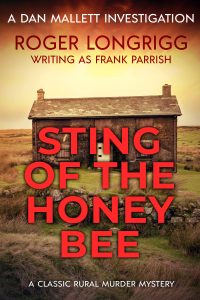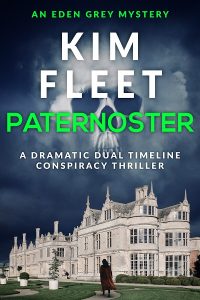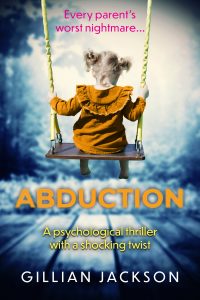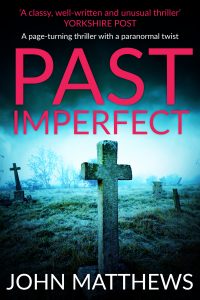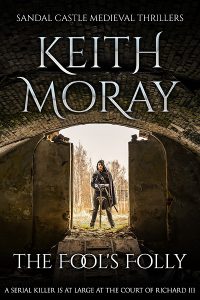We are delighted to announce that we have signed up the fourth instalment of Alexandra Walsh’s captivating Marquess House Series – dual timeline conspiracy thrillers with ingenious twists on Tudor and Stuart history – as well as the next novel in her new Victorian series.
In Alexandra’s words:
“It’s wonderful to have signed with Sapere Books to continue writing about my favourite eras: Victorian and Tudor. THE MUSIC MAKERS tells the tale of another branch of the family tree established in THE WIND CHIME (the first novel in my new Victorian series). THE MUSIC MAKERS follows two timelines: one set in the Victorian era and one set in the present day. The Victorian timeline follows the life of Esme Blood, a singer and performer in the music halls and theatres of London. Adopted at birth, Esme has no desire to find her birth mother, but fate has other plans. In the present day, Eleanor Wilder is recovering from a serious illness and has returned to the family farm in Pembrokeshire to rebuild her life. Delving into Esme’s life, she uncovers a tale of love, loss and survival, all of which help her to unravel her own problems and those of the man who has unexpectedly arrived in her life.
“My other forthcoming book, THE JANE SEYMOUR CONSPIRACY, is a return to Marquess House. Although I had always intended this series to be a trilogy, when I completed it in 2020 it felt as though there was more to tell. I resisted for a while but when Perdita, Piper and Kit began interrupting my research with suggestions, I realised my trilogy was about to expand. Having always pitched it as three-book series, I was unsure how Sapere Books would feel about it continuing, but my editor, Amy Durant, said she would be delighted to return to Marquess House.
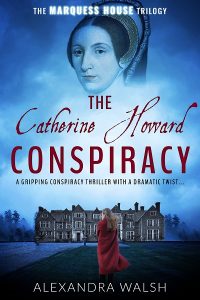 “THE JANE SEYMOUR CONSPIRACY follows Perdita and Piper as they fully embrace their lives at Marquess House. A friend of Kit’s asks for advice on a manuscript that has been in his family’s archive for generations, which seems to suggest an entirely new interpretation of the events leading up to Anne Boleyn’s execution, Jane Seymour’s marriage to Henry VIII and the death of the king’s only acknowledged illegitimate son, Henry Fitzroy, Duke of Richmond and Somerset. In the present, danger reaches out to Perdita and Piper again as they realise their battle with the Connors family is far from over. THE JANE SEYMOUR CONSPIRACY will be released in 2022.
“THE JANE SEYMOUR CONSPIRACY follows Perdita and Piper as they fully embrace their lives at Marquess House. A friend of Kit’s asks for advice on a manuscript that has been in his family’s archive for generations, which seems to suggest an entirely new interpretation of the events leading up to Anne Boleyn’s execution, Jane Seymour’s marriage to Henry VIII and the death of the king’s only acknowledged illegitimate son, Henry Fitzroy, Duke of Richmond and Somerset. In the present, danger reaches out to Perdita and Piper again as they realise their battle with the Connors family is far from over. THE JANE SEYMOUR CONSPIRACY will be released in 2022.
“Being part of the Sapere Books family is one of the best things about being published; Amy, Caoimhe, Richard, Natalie, Matilda and Helen make everyone feel so welcome and are a dynamic and forward-thinking team. My books could not be in safer hands. The weekly Zoom meet-ups with the other authors are fascinating, funny, inspiring and often educational! It’s a great feeling to be part of such a talented group of writers and publishers who are always willing to help or offer advice.”
Click here to find out more about The Marquess House Series
Click here to pre-order THE WIND CHIME
Sapere Books are proud to be sponsoring the Crime Writers’ Association’s Historical Dagger Award, which is for the best historical crime novel set in any period at least 50 years prior to the year in which the prize is presented.
This year’s judges were Janet Laurence, the author of four cookery books and a series of articles on historical cookery; Angela May Rippon CBE, a television journalist, newsreader, writer and presenter; and Professor Edward James, Emeritus Professor of Medieval History at University College Dublin.
The 2021 longlist has now been announced. Many congratulations to the following authors and publishers:
Justice for Athena by J M Alvey, Canelo Digital Publishing Limited
Snow by John Banville, Faber
Midnight at Malabar House by Vaseem Khan, Hodder & Stoughton
Riviera Gold by Laurie R King, Allison & Busby
The Unwanted Dead by Chris Lloyd, Orion Fiction, The Orion Publishing Group
Execution by S J Parris, HarperFiction, HarperCollins
The Night of Shooting Stars by Ben Pastor, Bitter Lemon Press
The City Under Siege by Michael Russell, Constable, Little, Brown Book Group
Skelton’s Guide to Domestic Poisons by David S. Stafford, Allison & Busby
Chaos by A D Swanston, Bantam Press, Transworld
The Dead of Winter by Nicola Upson, Faber
The Mimosa Tree Mystery by Ovidia Yu, Constable, Little, Brown Book Group
Following the publication of David Field’s absorbing Esther & Jack Enright Mysteries, Tudor Saga Series and Carlyle & West Victorian Mysteries, we are delighted to have signed up his new Medieval Saga Series.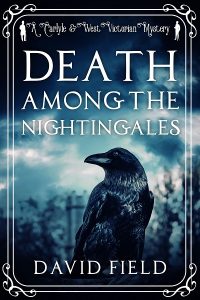
In David’s words:
“I consider myself blessed to have found Sapere Books, who not only share my enthusiasm for historical novels, but also provide the most generous author royalties in the business, and never lose sight of the fact that their many authors have invested a massive amount of emotional energy into creating, nurturing, and revealing their characters.
“It’s therefore with great optimism and a sense of purpose that I’ve embarked on my latest venture with them — the Medieval Saga Series, a set of seven novels that follow the fortunes of the same family from immediately prior to the Battle of Hastings all the way through to the death of Simon de Montfort in the Battle of Evesham in 1265.
“The first in the series — THE CONQUEST — introduces the Riveracres, a Saxon family living on the Sussex coast whose tiny village is directly in the path of Duke William of Normandy’s invasion army, and the Astenmedes, the local Thegn’s brood whose traditional privileged status is about to be shattered. Amidst the turmoil, two brave men, Will Riveracre and Selwyn Astenmede, form an unlikely partnership as they stand against both Duke William and Harald Hardrada’s invading Viking force to the north.”
Click here to find out more about the Esther & Jack Enright Mysteries
Click here to find out more about the Tudor Saga Series
Click here to find out more about the Carlyle & West Victorian Mysteries
Natalie Kleinman is the author of The Reluctant Bride, a glittering Regency romance with a strong-minded heroine at its heart.
I spent the first few years of my career writing contemporary romantic fiction, firstly short stories and then novels, until the burning desire I’d had for so long pushed itself to the forefront. I wanted to write a historical novel set in England’s glorious Regency period. Maybe I couldn’t, but I had to try. I’d previously looked upon it as a presumption on my part even to consider it, bearing in mind my love for the works of Georgette Heyer and Jane Austen. But I wasn’t trying to emulate them. I was trying to make my own contribution the genre that had given me so many hours of joy over decades. And so my first Regency novel, The Reluctant Bride, was born, to be followed by another, and then another. They’ll be coming soon, so watch this space.
Charlotte Willoughby — the heroine of The Reluctant Bride — is a young woman of her time. Born into the aristocracy, she is as much tethered by her status as privileged. When she is forced by her father to marry the Earl of Cranleigh, purely to satisfy his own interests, she has no choice but to comply. Six weeks later, fate takes a hand when her husband is killed in a riding accident. Free of a tyrannical parent and a loveless marriage, Charlotte begins to enjoy her newly found independence. Gresham, the earl’s cousin, undertakes to guard her from fortune hunters and, while she finds him arrogant and aloof, she cannot deny the security his protection affords her, particularly with regard to the unwelcome attentions of Lord Roxburgh. Acutely aware of the tension between the two men, Charlotte learns they have a shared history, the animosity of which still lies between them. With the coldness of one and the over-heatedness of the other, will she be able to find her own path to happiness?
Writing The Reluctant Bride, I settled into a deeply satisfying place where I was able to weave a tale while indulging in my love of the setting. I could see the magnificent houses and the glorious balls, but beneath all ran the story of a young woman, struggling with adversity, triumphing over it and finding her own way. I hope you enjoy it.
Click here to pre-order The Reluctant Bride
Click here to subscribe to Natalie’s newsletter
We are delighted to announce that we have signed a new Leicester-based crime series by C V Chauhan.

C V Chauhan
The series follows Detective Rohan Sharma as he unravels a succession of dark and thrilling mysteries.
In C V Chauhan’s words:
“I’m absolutely delighted to have been signed by Amy and her team at Sapere for my new, three-book series which breaks new ground in the genre. I’ve been made most welcome by all members of the team and by my fellow authors. It’s a very friendly and supportive community, and I feel privileged to be part of it.
“If you like your crime fiction with added spice, then you’ve come to the right place. THE DANCE OF DEATH, my debut novel, introduces you to Rohan Sharma, an able, erudite detective who lives in the heart of the Asian community in Leicester and who has a talkative, African grey parrot for company. Recently divorced, he is the father of two children.
“In the first instalment in the series, Rohan Sharma and his team hunt for a psychopathic killer while dark forces undermine his work and put others in danger.
“THE DANCE OF DEATH will be published in the near future, and I’m currently working on the next Rohan Sharma novel. I’m not going to give away too much at the moment, but suffice to say it’ll have an international dimension. More on this later…”
Sapere Books are proud to be sponsoring the Romantic Novelists’ Association’s Popular Fiction Award. The 2021 shortlist featured gorgeous beaches, family reconciliations, magical Christmas romances and more.
On Monday night, the wonderful Julie Houston was announced as this year’s winner at the Romantic Novelists’ Association’s digital awards ceremony.
Her winning novel, Sing Me a Secret, is a sharp and witty tale that follows the estranged Sutherland sisters, who each followed very different callings in life. Popstar Lexia is returning to her hometown, where she must face memories that she would rather keep buried. Juno, now the village doctor, juggles her career with the demands of her children and her role in the local production of Jesus Christ Superstar. Pandora devotes her time to village committees and taking charge of the local choir, and Ariadne is a dissatisfied schoolteacher. As the village musical draws them together, family secrets and past grievances are unearthed, and the sisters must summon the will to put aside their differences and move forward…
We would like to send a huge congratulations to Julie, and to all of the fantastic authors who were shortlisted this year.
Set in seventeenth-century Leiden, The Netherlands, Graham Brack’s funny and immersive Master Mercurius Mysteries follow Mercurius — a witty university lecturer-cum-sleuth.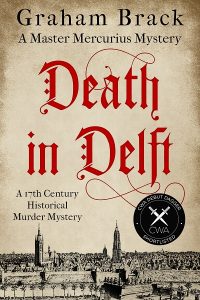
The first four books in the Master Mercurius series are published, and we are delighted to have signed up the next instalment: THE VANISHING CHILDREN.
In Graham’s words:
“I’ve been delighted with the response from readers to the Master Mercurius Mysteries. It’s wonderful to read good reviews, not only for myself, but also for Sapere Books, who always had faith in the stories. Being part of the Sapere family is very encouraging to any author; we enjoy our colleagues’ successes. I wouldn’t want to be anywhere else.
“The fifth book sees Mercurius sent to Amsterdam which — even in 1684 — was not a place where a minister who has led a sheltered life as he has would feel comfortable. On top of that, he has been sent to bully the city authorities into handing over their taxes in full. However, while he is there, he is approached by a local merchant who tells him that three children have gone missing, and their families have been fobbed off by Amsterdam’s powers that be.
“So begins an inquiry that makes Mercurius question his own faith as well as his suitability for the task he has been given…”
Click here to order DEATH IN DELFT
Click here to find out more about the Master Mercurius Mysteries
Sapere Books are proud to be sponsoring the Romantic Novelists’ Association’s Popular Fiction Award. Read on to find out more about this year’s fantastic shortlist!
Sing Me a Secret, Julie Houston, Aria, Head of Zeus
Sing Me a Secret is a sharp and witty tale that follows the estranged Sutherland sisters, who each followed very different callings in life. Popstar Lexia is returning to her hometown, where she must face memories that she would rather keep buried. Juno, now the village doctor, juggles her career with the demands of her children and her role in the local production of Jesus Christ Superstar. Pandora devotes her time to village committees and taking charge of the local choir, and Ariadne is a dissatisfied schoolteacher. As the village musical draws them together, family secrets and past grievances are unearthed, and the sisters must summon the will to put aside their differences and move forward…
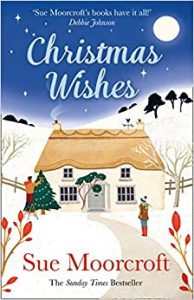 Christmas Wishes, Sue Moorcroft, Avon
Christmas Wishes, Sue Moorcroft, Avon
Christmas Wishes is a heart-warming story of missed opportunities and second chances. When old friends Hannah and Nico return to their childhood home, the village of Middledip, they soon wonder whether their chance for romance has finally arrived. But each faces their own complications — Hannah has recently lost her business in Stockholm and now must take care of her grandmother, and Nico is responsible for two children. And with more obstacles on the horizon, the would-be lovers must decide whether they can find a way to be part of one another’s lives…
Sunny Days and Sea Breezes, Carole Matthews, Sphere, Little Brown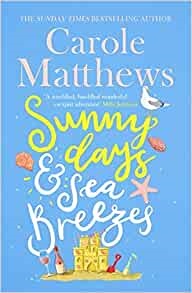
Set on The Isle of Wight, Sunny Days and Sea Breezes is a gorgeously romantic summer adventure. Jodie Jackson has left behind her career and husband in London and has decided to spend some time on her brother’s houseboat, Sunny Days. But when she meets Ned, the handsome wood-carving sculptor who lives on the next-door houseboat, it seems that her craving for solitude is destined to go unfulfilled. And as she spends more and more time with her attractive new neighbour, Jodie begins to wonder whether a new life filled with sun, sea, and freedom is just what she needs…
 A Perfect Cornish Escape, Phillipa Ashley, Avon
A Perfect Cornish Escape, Phillipa Ashley, Avon
A Perfect Cornish Escape is a moving, uplifting tale of past pain and new beginnings. After the death of her husband seven years ago, Marina Hudson has never opened her heart to another. But when she meets the kindly newcomer Lachlan, she starts to wonder whether she is ready to give love a second chance. Marina’s cousin, Tiff Trescott, is living the dream as a journalist in London, but when her boyfriend betrays her, she is left reeling. After retreating to Marina’s Cornish cottage to heal, Tiff crosses paths with the mysterious Dirk and is thrown into a whole new way of life. And as the summer wears on, both cousins begin to hope that a fresh start is on the horizon…
The Two Lives of Lydia Bird, Josie Silver, Penguin
The Two Lives of Lydia Bird is a beautiful story of grief, love and healing. After ten years together, Lydia and Freddie are finally planning to get married. But when Freddie dies in a car accident, Lydia’s life falls apart. And then the impossible happens: she is given a chance to re-live her old life with Freddie, without the final tragedy. And now Lydia faces a dilemma: she must decide whether to retreat into her past, or accept the help of someone who wishes to guide her into the future…
The winner will be announced at a digital event on Monday 8th March.
The Scorpion Squad Military Thrillers follow an American Battalion fighting in the Vietnam War. Below, Kevin D. Randle (Lt. Col. USAR) — one of the authors behind the pseudonym Eric Helm — reflects on the real-life experiences that provided the inspiration for the series.
I graduated high school the day before my 18th birthday in June 1967. In July, I was on a bus headed to Fort Polk, Louisiana, for basic  infantry training and in October, I was assigned to Fort Wolters, Texas, for my AIT, advanced individual training, which was as a helicopter pilot. From there I was sent to Fort Rucker, Alabama, to complete that training. In August 1968, as a 19-year-old teenager, I was appointed a warrant officer and then graduated from flight school as a helicopter pilot.
infantry training and in October, I was assigned to Fort Wolters, Texas, for my AIT, advanced individual training, which was as a helicopter pilot. From there I was sent to Fort Rucker, Alabama, to complete that training. In August 1968, as a 19-year-old teenager, I was appointed a warrant officer and then graduated from flight school as a helicopter pilot.
On September 23, 1968, I arrived in South Vietnam. We landed at Ton Son Nhut and were herded aboard buses that had no air conditioning. We all were covered with sweat within minutes of leaving the aircraft. The bus had screens over the open windows, but the pattern was something like an inch square. It wouldn’t keep out the insects. Someone said it was to keep out the grenades, and someone else said, “Yeah. Now they tie fishhooks to them.”
From Saigon we drove to Bien Hoa, Long Binh complex and the 90th Replacement Battalion. From there, a day or two later, I, with three other warrant officers, was assigned to the 116th Assault Helicopter Company at Cu Chi.
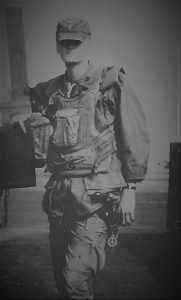
Kevin Randle after a day of flying combat assault missions in Vietnam.
During that first week, I flew rarely. There was an orientation flight to show me the local area. There was a check ride to ensure that I knew what to do if the engine quit, and to demonstrate my other skills. When that was completed, I was assigned to a flight, and then began flying combat assault missions. That meant that we picked up soldiers in one place, took them to another and landed. While many of those missions were without incident, some of them were more than a little exciting. Nothing beats sitting in a pick-up zone to evacuate soldiers while the enemy pumps small arms fire into the flight. You’re sitting in a plexiglass encased cockpit, easily visible to the enemy and have no recourse but to sit there as the windshields break and the instrument panel disintegrates.
One of the first night missions I flew, as what was known as a peter pilot, meaning that I was the co-pilot, was into an PZ we knew was going to be hot. The soldiers were taking fire and we were going to extract them. There were tracers flying all over the place. Red ones from our weapons and green and white ones from the enemy. They dropped a few mortars on us as well, which erupted into a shower of sparks and had that been just a little more colourful, it would have looked like fireworks.

Flying formation on the way to a combat assault.
Everyone took some hits, but most of the damage was superficial. One of the aircraft, if I remember correctly, was left in the PZ. The engine had been hit and failed. The crew was picked up by another aircraft, which means that they abandoned the aircraft and ran to one of the others. The gunships, which had been working over the tree lines and enemy positions, took it out with rockets, setting it on fire to prevent the enemy from getting anything of value from it.
We were on the ground for thirty seconds to one minute as the soldiers scrambled onto the helicopters. Our door gunners and crew chiefs used their M-60 machines in an attempt to suppress the enemy fire. They aimed at the muzzle flashes of the enemy weapons.
That was the last flight that night. Once we had the soldiers out, I suspect the Air Force might have dropped some ordnance on the enemy positions, or the artillery might have dropped a few rounds on them. I really don’t know. Once we dropped off the soldiers, we were released and returned to Cu Chi so that maintenance could patch up the aircraft.
We are delighted to announce that we have signed a new Tudor mystery series by C P Giuliani.
The Tom Walsingham Mysteries follow a young sleuth as he becomes embroiled in the shady world of espionage. The first instalment will be published in 2021.
In Giuliani’s words:
“Signing with Sapere Books for my first murder mystery series has been truly wonderful!
“Book 1, A Road to Murder, is set in 1581 between England and France, and follows a young diplomatic courier’s efforts to untangle a murder that could have wider, political implications. With France constantly teetering on the brink of religious unrest, and Queen Elizabeth toying with the idea of marrying the French king’s Catholic heir, even the death of a glove-maker can hide sinister machinations. And my hero, Tom Walsingham — a relation to Queen Elizabeth’s powerful spymaster, Sir Francis Walsingham — knows better than most just what could be at stake…
“This is going to be my first publication in the UK, and Amy and the whole team at Sapere Books are being incredibly supportive, friendly and very competent — and they have gathered together a very welcoming author community. A lovely experience through and through.”
In this blog series, Sapere Books spotlights authors whose books have gone out of print and whose work we are republishing, in an effort to revive the most vibrant and engaging voices of the past. This month, we are delighted to share a guest blog written by Gary and Nigel Davison, in memory of their father, Geoffrey. Geoffrey Davison is the author of the Stephen Fletcher Espionage Thrillers.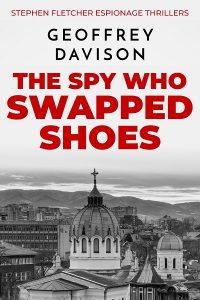
Our abiding memory of our father is of him sitting back in his reclining red leather chair in his study, deep in thought and invariably with a glass of red wine to hand and to the sound of Perry Como or similar. Although he wrote all his books in longhand, we both seem to remember him most frequently ‘plotting’ rather than actually writing. To Geoffrey, the plot — the twists and turns of a good story — was the thing and he was never happier than when devising his storyline.
Born and living most of his life in or around Newcastle upon Tyne, Geoffrey always aspired to write, and it was no coincidence that he moved from his commercial practice as a quantity surveyor to lecturing at Newcastle upon Tyne Polytechnic, where he rose to Head of Department and where the extended holidays in the 1970s and 80s provided the ideal uninterrupted opportunity for his writing.
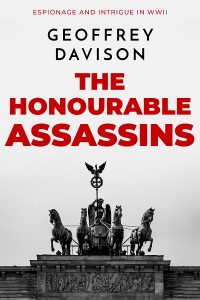 First published at the age of 40 with The Spy Who Swapped Shoes — a title which seems to typify the espionage genre in which Geoffrey began his writing career in the 60s with his Cold War hero Stephen Fletcher — he went on to publish twelve books. All would fall firmly within the thriller category, set against backgrounds ranging from Cold War espionage to World War Two (with titles such as The Honourable Assassins set within Valkyrie plot), the French Foreign Legion (with titles such as The Bloody Legionnaires) and international politics (his later work, such as The Malaysian Conspiracy). All also gave him the opportunity to follow his other great passion of travelling. Frequently accompanied by his friend, an amateur artist named Newton, and with the support of Northern Arts, he would set off to Berlin, other Eastern European cities, the South of France and later to the far East in the name of research whilst always still finding time for the odd period of relaxation and ‘character spotting’.
First published at the age of 40 with The Spy Who Swapped Shoes — a title which seems to typify the espionage genre in which Geoffrey began his writing career in the 60s with his Cold War hero Stephen Fletcher — he went on to publish twelve books. All would fall firmly within the thriller category, set against backgrounds ranging from Cold War espionage to World War Two (with titles such as The Honourable Assassins set within Valkyrie plot), the French Foreign Legion (with titles such as The Bloody Legionnaires) and international politics (his later work, such as The Malaysian Conspiracy). All also gave him the opportunity to follow his other great passion of travelling. Frequently accompanied by his friend, an amateur artist named Newton, and with the support of Northern Arts, he would set off to Berlin, other Eastern European cities, the South of France and later to the far East in the name of research whilst always still finding time for the odd period of relaxation and ‘character spotting’.
We remember the excitement as a box of new books would be delivered and opened, checking the covers and dedications, looking at the reference to the growing back catalogue, and the thrill of seeing them in foreign languages. But most of all we both remember the surprise and indeed the pride each us felt on the many occasions that we reminded ourselves that we had just read something written upstairs with a glass of red wine to hand and to the music of Perry Como, and that ‘the old man’ had just thrown in a plot twist that we never saw coming.
Click here to order The Spy Who Swapped Shoes
Click here to find out more about the Stephen Fletcher Espionage Thrillers
Ronald Healiss is the author of ARCTIC RESCUE: A MEMOIR OF THE TRAGIC SINKING OF HMS GLORIOUS. For Remembrance Day, his son, Doug, shares some memories of his father along with a poem Ronald wrote towards the end of his life.
Passers By
We are only passers by — through this world of sorrow
Here today a little while and gone tomorrow
Only once we come this way
We can’t come back
Let us make this world a little brighter
Scattering our seeds of friendship in the wayside grass
Some day they may bloom and cheer some poor pilgrim with a heavy load
Of doubt and fear
Life is just a journey, doesn’t it seem madness
The envy and enmity, the sorrow and the sadness
All the world’s great wealth for which men fight and kill and lie … is it worth it
when you think…
we are only passers by
Ronald Healiss wrote Passers By just a day or two before he passed away on 25th December 1980 (yes, at noon on Christmas Day! His Liverpudlian humour would no doubt have led him to think it was nice timing!). Ronald had been one the few survivors of the most tragic events of World War Two, the sinking of HMS Glorious and her two escorting destroyers, Acasta and Ardent, which cost the lives over 1,500 men.
Although he managed to record his memories of this horrific ordeal in his book, ARCTIC RESCUE, he rarely talked about his experiences and could never be found on Remembrance Sunday while other members of the family watched the commemoration at the Cenotaph on television.
In the years after his death, Passers By, which was dedicated to the deceased crew of the three ships, has been read out at a number of Remembrance Services held by the HMS Glorious, Ardent & Acasta Association at HMS Drake, Plymouth, and is being shared with you now to commemorate the lives that were lost.
We will remember them.
Set in England during the Second World War, Charlie Garratt’s Inspector James Given Investigations follow a troubled detective as he uncovers the truth behind a series of suspicious deaths.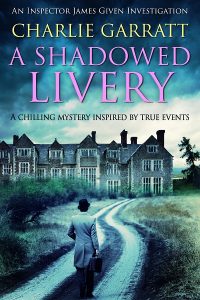
The first four books in the series are already published, and we are delighted to announce that we have now signed up the fifth instalment.
In Charlie’s words:
“I could hardly believe it when Sapere Books accepted my first and second novels, so I’m delighted to have signed a contract for my fifth: A LEAMINGTON DEATH. In this instalment, James returns from war-torn France to settle into a quiet life working for his father, when a request from his old boss to help with a simple factory theft turns into a murder investigation. James’ initial reluctance to become involved is tempered by the debts he owes to the victim.
“The team at Sapere could not have been more supportive to me as an author on this journey, with excellent advice, high-quality editing, great marketing and very fair royalties — paid very promptly. The regular get-togethers they organise for their authors also offer a great exchange of experience and ideas, something other publishers could learn from.”
Click here to order A SHADOWED LIVERY
Click here to find out more about The Inspector James Given Investigations
Sapere Books are proud to sponsor the Crime Writers’ Association’s Historical Dagger Award, which is for the best historical crime novel set in any period at least 50 years prior to the year in which the prize is presented.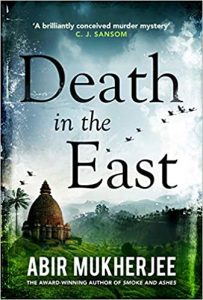
The 2020 shortlist featured eccentric doctors, notorious gangsters, stolen diamonds and much more.
On Thursday night, the fabulous Abir Mukherjee was announced as this year’s winner at the Crime Writers’ Association’s digital awards ceremony. His winning novel, Death in the East, is the fourth instalment in his Wyndham & Banerjee Mysteries Series.
Set in 1920s India, Death in the East follows the continuing adventures of dynamic duo Captain Sam Wyndham and Sergeant Surrender-not Banerjee. Wyndham is haunted by an old case from his early days as a young constable, when his old flame Bessie Drummond was found beaten to death in her own room. Arriving at the ashram of a sainted monk – where he hopes to overcome his opium addiction – Wyndham finds a shadowy figure from his past, a man he believed was long dead. Certain that the man is out for revenge, Wyndham once again calls on Sergeant Banerjee for help. Together, they prepare to take on a sadistic and slippery killer…
We would like to send a huge congratulations to Abir, and to all of the wonderful authors who were longlisted and shortlisted this year.
Stephen Taylor is the author of A CANOPY OF STARS, a thrilling historical 19th century saga stretching from the legal courts of Georgian London to the Jewish ghetto in Frankfurt.
When I start to write a novel, the first thing I always do is open a document that I call ‘Conceptualising’. I put down my initial thoughts, sketch out a skeleton storyline. Then I start researching and populate this document with historical facts and ideas that I can use.
When I came to write A CANOPY OF STARS, my first port of call was a website — Punishment at the Old Bailey: Old Bailey Proceedings Online. Here I could view actual cases going back hundreds of years. I came across the trial of Peter Shalley (REF: T17900113-17) that took place in 1790. Shalley was a German immigrant who was accused of the theft of half a sheep’s carcass worth just 40 shillings. His story, through an interpreter, was that he was offered a shilling to carry the carcass to Oxford Road from a field outside London. When he said he didn’t know where Oxford Road was, the man said: ‘Don’t worry, I’ll walk behind you and each time you come to a junction, look behind you, and I’ll point which way to go.’ When he got to Oxford Road, the Watchman challenged him, and the other man ran away. To me, this was a reasonable defence — he had been duped.
But the system was stacked against him, for while he was an educated man, he was a Jewish immigrant and spoke little English; he was seen as just another piece of London’s low life to be dispatched by the hangman with little ceremony and no one to mourn him. Even the valuation of the sheep at exactly 40 shillings made it a felony (not a misdemeanour) and therefore punishable by death.
I found this disturbing; it may have been over two hundred years ago, but I was stung by the injustice of the case. I was upset; the wrong done to this man was so plain to see and became like a nagging toothache. So I resolved to restructure A CANOPY OF STARS; it would still be a Georgian courtroom drama, but — through the character David Neander — I would also write Peter’s own story as I saw it. Images danced in my mind; what sort of man was this Peter? Why had he left his native Germany; why had he come to England?
In England, this was a time of the enlightenment; there was a clamour for reform. Power, however, lay in the hands of the aristocratic landowners who viewed reform as a threat. In the German states, this was a time of nationalism, a distrust of all things un-German. This is the backdrop to David’s story. How did he navigate his way through it?
Click here to order A CANOPY OF STARS
Marilyn Todd’s witty and atmospheric Julia McAllister Victorian Mysteries follow a courageous female photographer-cum-sleuth as she investigates London’s shadiest characters.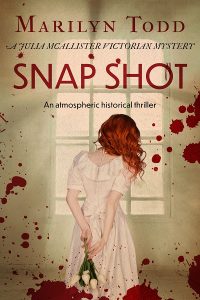
The first two books in the series — SNAP SHOT and CAST IRON — are already published, and we are delighted to have signed up the next two instalments.
In Marilyn’s words:
“I’m thrilled to be continuing Julia’s story, and quite frankly, having this series in the hands of a dynamic publishing team like Sapere is the icing on the cake!
“The third instalment, BAD BLOOD, sees Julia tasked with photographing the scene of a factory owner’s murder. A man who treated his workers like dirt, and his wife even worse. It’s not so much a question of who’d want him dead — more who wouldn’t. But eight years earlier, his son was abducted, and Julia soon realises that the kidnap and murder are connected. The trouble is, knowing who’s responsible is one thing, proving it is quite another. Especially when the killer knows she’s on to them.
“This is followed by DEAD DROP. Music halls were a popular antidote to the noise and smoke belching out of the Industrial Revolution, but the lives of the entertainers were gruelling. When a young showgirl is found hanged, Julia doesn’t believe it was suicide. Too late, she discovers that the truth hurts, but secrets kill, putting her own life on the line…”
Click here to find out more about the Julia McAllister Victorian Mysteries
Gaynor Torrance’s absorbing DI Jemima Huxley Thrillers follow a determined and resourceful female detective as she unravels gruesome crimes.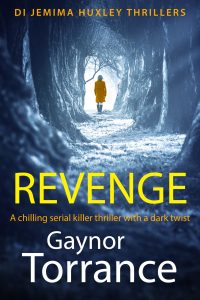
The first three books in the series, REVENGE, SOLE SURVIVOR and STALKED are already published. We are excited to announce that we have now signed up a further three instalments.
In Gaynor’s words:
“I am delighted to have signed with Sapere Books for a further three instalments of the DI Jemima Huxley Thriller series, as Jemima has many more cases heading her way. It really is a dream come true for me and I’m thrilled that Amy Durant – editorial director at Sapere Books – is keen for Jemima’s story to continue.
“GONE – the fourth book in the series – is due to go on pre-order soon. What starts out as the investigation into a young woman’s murder quickly evolves in some surprising ways. And in the inimitable Huxley style, I guarantee that the story is both dark and shocking. Jemima’s life will change forever when it takes an unexpected turn, and Broadbent has the chance to become a hero.”
Click here to find out more about the DI Jemima Huxley Thrillers
Following the publication of Linda Stratmann’s sensational Mina Scarletti Mysteries – Victorian crime novels with a courageous woman sleuth at the centre – editorial director Amy Durant has signed up her exciting new series, which follows a young Sherlock Holmes. The first instalment will be published next year.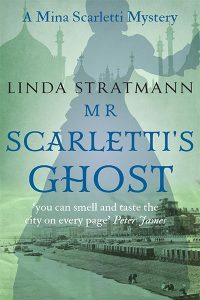
In Linda’s words:
“22 year old Sherlock Holmes, realising that his destiny is to be the world’s first and best consulting detective, has abandoned conventional education and come to London to acquire the very particular and unusual skills and knowledge he needs for his chosen career. This is Holmes before Watson: youthful, fiery, determined, energetic, still learning his craft. This is the legend in the making, the story of how young Holmes became the Holmes we know.
“Sherlock Holmes is the epitome of the great detective, iconic and instantly recognisable. It was a tremendous thrill to be asked to create new adventures and explore those periods of Holmes’s life which Conan Doyle left to the imagination. It is a pleasure to continue working with the wonderfully supportive team at Sapere Books, and to be a part of the Sapere family of authors.”
Click here to order MR SCARLETTI’S GHOST
Click here to find out more about the Mina Scarletti Mysteries
Elizabeth Bailey’s Regency-era Lady Fan Mysteries follow Ottilia, a courageous woman sleuth faced with gruesome deaths, buried scandals, witch hunts and more.
The first six books in the series are already published, and we are delighted to have signed up the seventh, THE DAGGER DANCE.
In Elizabeth’s words:
“In THE DAGGER DANCE, Lady Fan is off to rescue a Barbadian slave girl accused of murder. I’ve been wanting to bring this story to light, since Ottilia long ago guessed her steward Hemp had a secret heartache for a lost love. Bristol was at that time a major port for shipping traders doing the rounds from Africa to England and the West Indies. The research was almost as engaging as writing the book.
“With this seventh adventure, I count myself a very lucky member of the Sapere Books author family. Sapere has done wonders for Lady Fan, and it’s a joy to be with such a supportive and encouraging publisher where the author’s contribution is so much valued and validated.”
Click here to order the first Lady Fan Mystery, THE GILDED SHROUD
Click here to find out more about the Lady Fan Mysteries
We are delighted to announce that we have signed up a new Regency romance novel by Graham Ley.
Writing runs in the family: Graham’s mother, Alice Chetwynd Ley, was the author of numerous Regency romances. Sapere Books have reissued sixteen of her books, including The Eversley Saga and The Rutherford Trilogy.
In Graham’s words:
“I decided to write a novel in my mother’s honour. Then the world speeded up. In place of the familiar books in covers, there were eBooks, and over the last few years her complete backlist has been published by Sapere Books.
“I’ve written a fair bit in the past – playscripts and poetry, and some children’s stories. My greatest challenge was undoubtedly what kind of heroine should I choose. In the end, Arabella chose herself, and was her own woman from start to finish. I set the story in Devon and Brittany, which I love equally, and added intrigue, conspiracy and action to the romantic mix.
“I shall be delighted to see my own tribute novel sitting alongside my mother’s books with such a strong specialist publisher! I hope readers enjoy The Baron Returns.”
When I wrote A Shadowed Livery, it didn’t occur to me that Inspector James Given would spawn a series, so I happily scribbled away with no thought of the future. But the series developed, and by three-quarters of the way through the third novel I was trying to think of ways of  killing him off, so I could move on to other projects. I’m not unusual in this. Conan Doyle famously had Holmes plunge from the Reichenbach Falls, only to re-emerge alive in a later story, and virtually all of our favourite Game of Thrones characters met their deaths before the end. However, I had a slightly more difficult problem than those. My series is written in first person, from James’s point of view, so how could he tell the stories if he were dead? It has been done, but I didn’t like it as a device.
killing him off, so I could move on to other projects. I’m not unusual in this. Conan Doyle famously had Holmes plunge from the Reichenbach Falls, only to re-emerge alive in a later story, and virtually all of our favourite Game of Thrones characters met their deaths before the end. However, I had a slightly more difficult problem than those. My series is written in first person, from James’s point of view, so how could he tell the stories if he were dead? It has been done, but I didn’t like it as a device.
The simple answer is he didn’t die, and I’m still working out how he might.
As a result, when I finished A Patient Man, I was on the lookout for ideas for the next in the series when a story arose on the Facebook page for my local area. The posts said a man with a bicycle had been found dead in the River Severn, under a bridge about a mile from my home. It turned out not to be true and, if it were, I probably wouldn’t have written about it. But it was such a bizarre image, not just the body in the water, but the bicycle with him, I knew there had to be a story there. The old ‘what if?’ kicked in, and Where Every Man was underway.
In the first three novels, James Given is living in Kenilworth, Warwickshire, and I could have moved him close to where I live in Shropshire for the new one, but at the end of A Patient Man he was contemplating a move to France. I’ve always wanted to live there, so why not take James instead? There were, however, some practical considerations, not least of which were that at the time of the action the Second World War had begun, German forces were on the French border, James is Jewish and the ferries had been commandeered for military service.
Despite these difficulties, James and his wife make it to Brittany, with the help of an acquaintance, to settle into a life of country air, good food and new friends. But that wouldn’t necessarily have made for a good story. When the local librarian is found dead in the river, with her bicycle by her side, things become a lot more interesting.
Where Every Man is the fourth James Given novel and is due for release on 6th October.
Click here to pre-order Where Every Man
Click here to find out more about the Inspector James Given series
J C Briggs’ gripping Charles Dickens Investigations follow the famous writer-turned-detective as he dives into the seedy underbelly of Victorian London.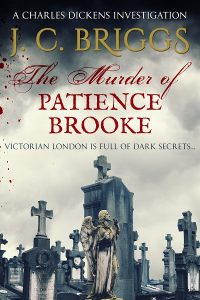
The first six books in the series have been published, and we are thrilled to announce that we have signed up the next two instalments.
In J C Briggs’ words:
“I am thrilled that Sapere Books are to publish two new cases featuring Charles Dickens and Superintendent Jones. Number seven in the series is THE HAWKE SAPPHIRES, which begins at Hawke Court, an almost derelict mansion where Sir Gerald Hawke is dying. His two wives and his only son are dead. His heir is a clergyman, Meredith Case, for whom Hawke has one last command. Hawke has commanded all his vicious life and expects to be obeyed. Meredith Case must ‘find Sapphire Hawke’, who vanished over twenty years ago.
“A chance meeting with Charles Dickens sends Case to the north of England. Meanwhile, Dickens and Superintendent Jones of Bow Street are investigating the death of a young man who was found on the steps of a bookshop.
“Charles Dickens begins to suspect that the two cases are connected. He and the young detective, Scrap, experience a frightening night at Hawke Court.
“Book eight in the series is THE CHINESE PUZZLE. On the first day of The Great Exhibition in May 1851, a Chinese man bowed before Queen Victoria. It was assumed that he was a representative of the Celestial Empire. He wasn’t. It was reported in the newspapers of the day.
“In THE CHINESE PUZZLE, behind the scenes the Home Secretary is furious at the breach of security. There have been attempts on the Queen’s life before.
“And also concerning for the government, a wealthy banker and former opium merchant of Canton vanishes on the first day of the Exhibition. The Prime Minister, Lord John Russell, appoints Superintendent Jones to carry out a most secret investigation. The case may involve high-powered bankers and politicians. Jones cannot afford to get it wrong. Only Charles Dickens can help him find his way about the houses of some very important people. There is danger from high and low when the case takes them to the East End opium trade and some very dangerous criminals.
“It really is great to work with Sapere Books again and to know that they have faith in my series. They are a wonderfully supportive publisher to all the writers in the Sapere family.”
Click here to order THE MURDER OF PATIENCE BROOKE
Click here to find out more about the Charles Dickens Investigations
Michael Fowler’s DS Hunter Kerr novel, SHADOW OF THE BEAST features a horrific serial killer. Read on to find out more about where the inspiration for the Beast of Barnwell ― the murderer in this story ― comes from.
The ‘Beast’ is loosely based on Peter Pickering from Wombwell, near Barnsley, who was dubbed ‘the Beast of Wombwell’ by the press following his conviction in 1973 for the rape and murder of 14 year-old Shirley Ann Boldy, when he was jailed indefinitely.
Peter abducted Shirley Ann as she walked back to school at lunchtime, driving her to woods in the village of Barnburgh, where he tortured and raped her before stabbing her with a kitchen knife. Peter had to flee with her body in his van when he was disturbed by three men walking in the woods who tried to intervene after hearing her screams for help.
Arrested later that day, he had dumped Shirley Ann’s body, cleaned his van, burned his clothes and sandpapered and bleached his shoes in a hope of hiding evidence; however, he eventually confessed, blaming his mother for the killing, telling detectives that she would never allow him to have a girlfriend, and he could see her face as he killed Shirley.
The killing of Shirley Ann came just five months after he was released from prison after a six-year jail term for sex attacks on a teenage girl in Doncaster and Scarborough.
Detectives who dealt with Pickering firmly believed that Peter was responsible for more rapes and murders and were particularly interested in him for the unsolved murders of 13 year-old Anne Dunwell, from Rotherham, who was raped and strangled in 1964, and 14 year-old Elsie Frost from Wakefield, who was stabbed five times in 1965. He was visited several times while detained in Broadmoor by detectives and interviewed in connection with these murders, but he refused to cooperate.
However, in 2017, detectives had a breakthrough. Forensic evidence linked Peter to the murder of Elsie Frost and a fresh investigation was launched. During this re-investigation detectives discovered that Peter was renting a storage garage in Sheffield, and getting a warrant, they opened it up and found handcuffs, diaries and exercise books, which contained confessions. One of those confessions was the rape of an 18-year-old woman from Barnsley, which was undetected and after tracing the woman, who was then in her sixties, Peter was charged with that rape and convicted in 2018. Before he could be sentenced for that rape and also charged with the Elsie Frost murder, Peter died. He was 79.
Click here to order SHADOW OF THE BEAST
Click here to find out more about the DS Hunter Kerr Investigations
Following the publication of Alexandra’s Walsh’s captivating Marquess House Trilogy – dual timeline conspiracy thrillers with ingenious twists on Tudor and Stuart history – editorial director Amy Durant has signed her fourth book.
In Alexandra’s words:
“It’s very exciting to be working with Sapere Books on my new publication. THE WINDCHIME is a story that is very special to me, as it involves some of my own family history. Once again, it’s a dual timeline novel, with the split moving from the present day to the Victorian era. Set on the Pembrokeshire coast, it involves a multi-generational family with a secret at their heart. It also explores hereditary madness and the contrasting treatments of mental health in the Victorian era and the present day.
“A love story brings it all together as the present-day characters uncover the tragedy that took place in the past. I hope everyone enjoys this shift of era and will like my new characters. Once again, it’s been a pleasure to work with everyone at Sapere Books and be part of the Sapere family. Not only is the support and guidance of the publishing team of Amy, Caoimhe, Richard and Natalie, invaluable; the encouragement, friendship and advice of the other Sapere Books authors has been extremely helpful and has offered great inspiration.”
Click here to order THE CATHERINE HOWARD CONSPIRACY
Click here to find out more about The Marquess House Trilogy
Following the publication of Graham Brack’s darkly funny Josef Slonský Investigations – atmospheric police procedurals set in Prague – Sapere Books recently started publishing his Master Mercurius Mysteries: 17th century crime thrillers set in Leiden, The Netherlands. Taking centre stage is Mercurius – a witty university lecturer-cum-sleuth.
The first three books in the Master Mercurius series are published or available to pre-order, and we are delighted to have signed up the next instalment: THE NOOSE’S SHADOW. The fourth book sees Mercurius free from the demands of the Stadhouder – William I of Orange – for once as he is asked for help by a poor young woman whose husband faces execution for a murder he swears he did not commit. How can Mercurius refuse?
Graham says, “I was already part of the Sapere family after Amy signed me to write six Slonský novels, so I knew Sapere Books was the right place for my Dutch series too – and Slonský will be back! We’re a very supportive bunch of writers who enjoy each other’s successes, and the Sapere team is simply excellent. I couldn’t imagine going anywhere else with the Mercurius books.”
Amy says, “I have already worked with Graham on eight published books since we launched in March 2018, and I am thrilled to have signed his next book. I hope there will be many more! Fans of his previous series are already calling for a return of Slonský, and they seem equally smitten with Master Mercurius. I thoroughly enjoy reading Graham’s books and look forward to editing many more in the series.”
Click here to order DEATH IN DELFT
Click here to find out more about the Master Mercurius Mysteries
Each month, Sapere Books spotlights an author whose books have gone out of print and whose work we are republishing, in an effort to revive the most vibrant and engaging voices of the past.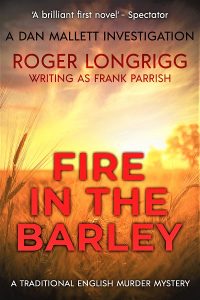
Born in 1929, Roger Longrigg was an impressively versatile author who wrote under several noms de plume. He used one of these – Frank Parrish – to pen the witty and suspenseful Dan Mallett Investigations, which Sapere Books is republishing. Set in the West Country of England in the 1970s, the cosy mystery series follows a crafty and likeable poacher as he unravels various crimes in the area – often committing several felonies himself in the process.
With its deft humour, clever plotting, and immersive rural setting, the first book in the series – Fire in the Barley – has been described by Roald Dahl as ‘exciting and funny from beginning to end’. The protagonist, Dan Mallett, has been praised as ‘a fully-fledged, all-of-a-piece original character in a well-conceived, excitingly paced story’ (The Times).
Roger’s daughter, Laura Longrigg, reflects on his life and career:
“Roger Longrigg worked in advertising in London in the early 60s; it’s also the setting of his first novel, A High-Pitched Buzz, full of the wild, clever, sexy, heavy drinking characters familiar from the cult TV series Mad Men of the same era.
“He dreamed of being a full-time writer but, despite receiving glowing reviews (including comparison to Evelyn Waugh), the book only earned him £100. His agent said, ‘You need to write three books a year to support the family, but not even Dick Francis fans want to read three of his in 12 months.’ So Roger wrote series of novels under different pseudonyms, eight in all. They include Laura Black: Scottish-based bodice-rippers; international espionage thrillers to emulate Ian Fleming under the name Ivor Drummond and psychological suspense by Domini Taylor, which included Mother Love, turned into an award-winning TV drama starring Diana Rigg. Perhaps most successful was Frank Parrish, creator of poacher turned detective Dan Mallett; the first in this series, Fire in the Barley, won the John Creasey Dagger in 1977 for best first novel. Roger had to turn it down, because it was actually his 26th!
“In all, Roger wrote 55 books of fiction and non-fiction; he thoroughly enjoyed the subterfuge of being behind so many different personalities and genres and it’s thrilling that he is about to find a whole new generation of readers through Sapere’s reissues, and that his real name can be revealed at last.”
Click here to order Fire in the Barley
Click here to find out more about the Dan Mallett Investigations
Following the publication of Deborah Swift’s extraordinary wartime sagas – PAST ENCOUNTERS and THE OCCUPATION – editorial director Amy Durant has signed four more of her books.
In Deborah’s words:
“I’m really thrilled to have signed with Sapere Books for my third WW2 novel, THE LIFELINE, in which a teacher flees Nazi-occupied Norway and escapes to Scotland on a small fishing boat, in an operation known as The Shetland Bus.
“Not only that, but I’ve signed with Sapere for three more historical novels set further back in time. The first, THE POISON KEEPER tells the story of Giulia Tofana, the woman who, according to legend, poisoned six hundred men in 17th Century Italy. The deadly poison Aqua Tofana bears her name. Italy in the 17th Century is a fascinating brew of baroque religion, art and culture, and the legacy of the ‘Camorra,’ the 17th Century Mafia. THE POISON KEEPER is set in Naples under the smoking shadow of Mount Vesuvius. There will be two further books in the Italian series; the other two books will be set in Venice and Rome.
“I was delighted to be offered a home for four new books (four books!) with Sapere, as not only do they offer very good royalty rates to authors, but they have a really strong, supportive author community.”
Amy commented: “Deborah is a wonderful storyteller, and I am extremely happy she has chosen to continue partnering with Sapere Books for her next four novels. Fans of her first two Second World War novels won’t have to wait much longer for her third wartime-era book; THE LIFELINE will be available to preorder soon.”
Click here to order PAST ENCOUNTERS
Click here to order THE OCCUPATION
Sign up to Deborah’s newsletter to stay up to date with her book news and latest releases.
It seems apt that I am writing this on the day that the A-level results are announced. I finished school many years ago, but can still recall the  excitement of finding out that I had been accepted at my university of choice to study psychology. With everything to look forward to, my head spun with expectations of what student life would be like. Little did I know that my entire existence was about to take a sinister turn. Until then, I’d lived a sheltered life and hadn’t heard of people being stalked. But that was about to change as my terrifying ordeal began only a few weeks later.
excitement of finding out that I had been accepted at my university of choice to study psychology. With everything to look forward to, my head spun with expectations of what student life would be like. Little did I know that my entire existence was about to take a sinister turn. Until then, I’d lived a sheltered life and hadn’t heard of people being stalked. But that was about to change as my terrifying ordeal began only a few weeks later.
It was a steep learning curve. If I were included in a random cohort of people and asked to order them by likeliness of being targeted by a stalker, I would have positioned myself towards the bottom of that list. After all, I was introverted, wasn’t going to turn anyone’s head and certainly didn’t court attention. I was someone people didn’t tend to notice. Though I later discovered that anyone, regardless of age, gender, or perceived physical attractiveness can be stalked, and stalkers are not exclusively male.
Even as I write this, I can feel my stress levels grow. Despite the passage of time, as I dredge up these suppressed memories, the old emotions rise like a tsunami threatening to overwhelm me. There are some things from that time that I refuse to discuss as those memories are far too traumatic. I also have no intention of naming the person who caused me so much mental and emotional anguish. Identifying him serves no purpose and might cause pain or embarrassment to other people, which I have no desire to do. It is enough for me to know that my ordeal is over. Apart from in nightmares, my stalker is no longer a threat to me.
It is essential to understand that this chapter of my life occurred way before the availability of mobile phones or the subsequent rise of social media. It was quite literally another world back then. At the time, there were no stalking laws in the UK. Society was far more misogynistic, and I would probably have been seen as a stupid young woman who had obviously brought it all on herself. It seemed to me that my only viable option was to deal with things alone.
Before I realised the threat he posed, I had allowed my stalker to enter my room at the hall of residence. Although I didn’t appreciate it at the time, I’d made a big mistake. It gave him access to information, and we’re all familiar will the old adage, ‘Information is power.’ He took the opportunity to familiarise himself with my lecture and seminar timetable. Naively I had it pinned on my noticeboard. From then on, he was able to predict my movements.
His behaviour quickly became alarmingly claustrophobic. And when I tried to distance myself, things escalated rapidly. For almost a year he followed me, watched me, sent anonymous threatening messages and on a few occasions, succeeded in cornering me. It was a relentless campaign of intimidation, designed to mess with my head. He even managed to convince people that he was a heartbroken innocent, and I felt ostracised when I most needed support.
I have no intention of giving you a blow-by-blow account of what happened. It would take too long, and I would feel uncomfortable about relaying some of the details. However, there are things I’m willing to share.
On one occasion, I’d gone home for a weekend visit and was travelling back to the university. I felt physically sick as I stood on the platform waiting for the train to arrive, as I dreaded him turning up. I breathed a sigh of relief as the train pulled in, found a seat, settled down and took out whichever book I was reading. There was plenty of time for me to lose myself in the story as it would take a few hours for me to reach my destination, and I certainly needed the distraction. About forty minutes into the journey, the woman opposite me got up to leave. And as the train pulled away from the station, someone else sat in that seat. As I glanced up, my blood ran cold. It was him.
I did my best to stay calm, but I was quaking inside. He crossed his arms and kept staring at me as I pretended to continue to read my book. Neither of us spoke until he leaned forward and placed his elbows on the table between us. I wanted to run, but there was nowhere to go.
He appeared calm as he told me that he had a ‘new best friend,’ someone who was helping him see things differently. They’d discussed things, and he now realised that he didn’t want a relationship with me. I had a glimmer of hope, but that light was soon extinguished. As his monologue continued, I deduced that the friend he was referring to was God. But what he went on to tell me was the scariest thing I had ever heard.
He claimed to be having frequent conversations with God, who had made him realise that I was evil and had to be stopped. He said that he had God’s permission to do whatever it took to make this happen. After all, he had right on his side. I could tell that this wasn’t some kind of sick joke. He believed everything he was saying.
My mind raced as the train approached my destination. I was all too aware of the impending showdown and didn’t want to end up injured or dead. The odds were stacked against me. He was far larger and undoubtedly stronger than me. I knew I was safe whilst I was on the train, as he surely wouldn’t harm me in public. But even when I got off the train, the university campus was still a few miles away. I couldn’t risk waiting for the bus I had planned to take. I had to get a taxi.
As the train pulled into the station, I sat in my seat for as long as I dared. It was a popular destination, and people were already queuing up to get off. Leaving my book on the table, I grabbed my bag, jumped up and pushed my way past people. I was shouting and distressed. It was one of the few occasions in my life when I wanted others to notice me. Thankfully people obliged and let me through, though none of them thought to ask me what was wrong or offer any help. I was banking on the fact that he couldn’t risk making a scene. It gave me the only advantage I was going to get.
I raced over the footbridge, panting and crying. Reached the taxi rank where a queue hadn’t yet formed. I jumped inside the nearest cab and told the driver to take me to the campus. But as the vehicle was about to pull away, the rear door opened and he calmly got in. ‘Thought you were going to leave without me,’ he said in a non-threatening way.
He grabbed my arm, and we sat in silence. When the cab eventually pulled up outside my hall, I dug the nails of my free hand into the back of his and shouted, ‘He’s paying.’ I ran, all the while fumbling for my keys. I made it inside and sprinted up two flights of stairs. Little did I realise that another student was on her way out of the hall and unhelpfully held the door open for him.
As I entered my corridor, I was dismayed to find it deserted. I’d been banking on there being other people around. My hand was shaking as I attempted to insert the key into the lock. I heard the door open off the stairwell, turned and saw him there striding purposefully towards me. I’d lost my chance. I couldn’t risk going into my room. If he forced his way inside, it would be game over. I knew from past experience what would happen. Instead, I ran to the communal toilets, which were almost opposite my room. All four cubicles were free. I got inside one, locked the door and started shouting for help.
Luckily for me, other students heard the commotion, and people soon arrived. My friend was amongst them and knew a little of what was happening to me. She helped me get back to my room, while some other girls attracted his attention. She came inside with me as she could see how scared I was. She was just closing the door when he realised what we’d done. He completely lost it and kicked the door in. Another student had the foresight to call security, and he was eventually forced to leave.
On another occasion he drove a car at me, screeching to a halt inches from where I stood. He calmly got out of the vehicle, stepped towards me and said, ‘If I can’t have you, no one will.’ Thankfully a stranger intervened. But nowhere was safe. I was isolated, terrified and didn’t know who I could trust.
When I returned for my second year at university, my tutor sat me down and informed me that he believed there was a credible threat to my life. My stalker had applied to study numerous courses at the university. He was frequently seen roaming the grounds and buildings despite being banned from entering the campus. Realistically I knew there was no way they could ensure that he was kept out. This guy was focused and had no intention of playing by the rules.
That morning I spent an hour or so in my tutor’s office as he made some phone calls, and just like that, I was transferred to another university. I had to leave without saying goodbye and immediately cut ties with my university friends. My world had become a real-life psychological thriller.
Throughout this entire ordeal, I was offered no support or counselling. It wasn’t the ‘done thing,’ back then. I was on a downward spiral with no safety net in sight. In public, I did my best to act as though nothing was wrong. It was a role I felt compelled to play. I wanted to move on, put things behind me and try to fit in. But I didn’t succeed. I couldn’t relax and frequently experienced panic attacks. In retrospect, I realise that I was suffering from PTSD. But at least I had walked away. I had survived. Though something had to give, and my studies suffered.
For many years, my children have often joked that I am the most paranoid person on the planet. They don’t appreciate that I spent such a sustained period living in fear. Thankfully I bear no physical scars from that time. Though, I carry mental and emotional wounds which have faded but will never fully heal.
An example of how messed up I had become is that throughout my twenties, I dreaded entering my own home if I happened to be alone. I’d put the key in the lock, take a deep breath, race to the kitchen and grab a sharp knife. My knuckles would be white and my hand shaking as I systematically walked from room to room, flinging open cupboard doors, looking behind curtains and beneath the furniture. It is a relief that I no longer feel compelled to do that.
Upon reflection, my behaviour was extreme and perhaps ridiculous. But unless you’ve experienced such an insidious long-lasting threat, you can’t begin to imagine how deeply it affects you. I can honestly say that in those days, I had become as obsessed with my stalker as he was with me.
As time passed with no contact, I still couldn’t get him out of my head. I had no idea where he was, but expected to find him waiting in the shadows. Even sleep failed to offer respite, as I experienced night terrors whenever I’d had a stressful day.
Then, I had a meltdown at work. It happened out of the blue on an ordinary afternoon. I hadn’t seen or heard from my stalker for years. I walked out of the ladies room just as the lift doors located directly opposite, opened. A man stepped out, we looked at each other, and he smiled. He was my stalker’s doppelganger. The likeness was uncanny. I kept facing him and quickly backed up to the ladies room, where I locked myself inside a cubicle and cried.
At that moment, I thought it was happening all over again. I couldn’t understand how he had found me after all this time. I knew I’d have to resign and look for another job as it wasn’t safe for me to continue working there. Eventually, I was all cried out, and some other women came in to use the facilities. I waited for them to enter the cubicles and went out to clean myself up, taking my time so that I could leave the room with them.
When I returned to my desk, I contacted reception, gave them my stalker’s name and asked for his extension number and details of which department he worked for. I was informed that no one with that name was employed there. It took a while for me to be convinced that the receptionist was telling me the truth. I later discovered that the man in question was actually someone else. He must have thought I was a lunatic.
There is no doubt in my mind that living through such a traumatic experience has shaped the person I went on to become. I’m introverted and do my best to avoid group interactions as I find them stressful. It seems that no matter how hard I try, I still feel like an outsider. I’m incapable of ‘fitting in’.
Of course, I have friends and family, and I value them highly. I’m comfortable when there’re just a handful of people I know and trust. But in larger groups, even virtual ones, I feel ill at ease. Though, every so often, I pluck up the courage to try again. Hopefully one day I’ll find it’s no longer a problem.
STALKED, the third book in the Jemima Huxley Thrillers series, is the story I always wanted to write. It is undeniably a work of fiction, but one created with an authentic understanding of what it is like to be in those particular crosshairs. I didn’t have to imagine what it would be like for my character, Violet Watkins — I know what she was going through.
If you have already read the book, you may think that the twist at the end is far-fetched. It was in fact inspired by information passed to me from someone who knew my stalker, and was a chilling indication that perhaps he hadn’t fully moved on. As a writer, I played around with the idea as I thought it would be perfect for this book. Though in my personal life, there was never any suggestion of such a threat.
Thankfully my ordeal is over. I am a very different person to the one I had hoped to be all those years ago. There are occasions when I wonder what path I would have followed if things had been different. But overall I have no regrets as I have so much to be grateful for.
If you have been affected by any of the issues raised above, the following organisations may be able to provide help and support:
Paladin National Stalking Advocacy Service
Sapere Books is always open for submissions, and we especially encourage writers of colour to send us their work. We recognise that writers of colour are underrepresented in genre fiction publishing, and we believe that it is important to take steps to address this.
We are an eBook-focused publisher; physical copies of books are made available on a print-on-demand basis.
We are looking for both new submissions and out-of-print titles in the following genres:
- Crime Fiction, Mystery and Thrillers
- Romantic Fiction and Women’s Fiction
- Historical Fiction (including Sagas, Mysteries, Thrillers and Romance)
- Action and Adventure (Military, Aviation and Naval Fiction)
- History and Historical Biography
If you are a writer of colour with a finished manuscript or an out-of-print book, please see our submissions guidelines and get in touch with our editorial director, Amy Durant: amy@saperebooks.com.
If you have further questions about the submissions process, or what Sapere Books is looking for, feel free to email them directly to Amy and she will get back to you as soon as possible.
Please click here to find out more about what we can offer authors.
We look forward to reading your work!
Sapere Books are proud to be sponsoring the Crime Writers’ Association’s Historical Dagger Award, which is for the best historical crime novel set in any period at least 50 years prior to the year in which the prize is presented.
The 2020 shortlist has now been announced, and features seventeenth-century plotters, stolen diamonds, sainted monks and more.
In Two Minds, Alis Hawkins, The Dome Press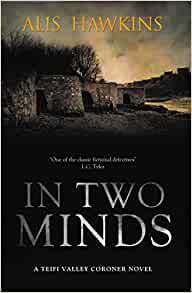
Set in nineteenth century Wales, In Two Minds follows two investigators – Harry Probert-Lloyd, a young barrister, and John Davies, a solicitor’s clerk – as they attempt to solve a grisly mystery. A faceless, naked corpse has washed up on a remote Cardiganshire beach, and no one can identify it. Harry’s attempts to solve the crime are met with local hostility and suspicion – especially when he chooses to consult an eccentric doctor with radical and controversial methods.
And when Harry’s own relations appear to be implicated in the crime, it seems he may be forced to choose between professional duty and familial ties…
Click here to find out more about In Two Minds
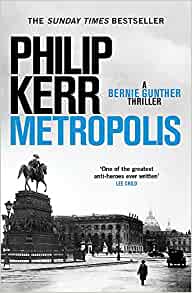 Metropolis, Philip Kerr, Quercus
Metropolis, Philip Kerr, Quercus
Detective Bernie Gunther is back in the fourteenth – and final – book in Philip Kerr’s gripping series of twentieth century thrillers. It’s 1928 and Bernie is just beginning his career in Berlin, at the height of the Weimer Republic. He is soon faced with a gruesome investigation when the bodies of four prostitutes are found, all murdered in the same brutal fashion. Before Bernie can make any headway with the case, yet another girl is found dead – this time the daughter of one of Berlin’s most notorious gangsters.
A murderer with a twisted agenda is prowling the streets of Berlin, and it’s up to Bernie to put a stop to their deadly spree…
Click here to find out more about Metropolis
Death in the East, Abir Mukherjee, Harvill Secker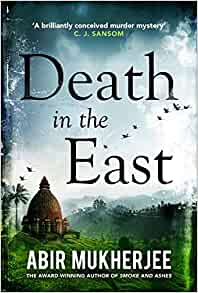
Set in 1920s India, Death in the East follows the continuing adventures of dynamic duo Captain Sam Wyndham and Sergeant Surrender-not Banerjee. Wyndham is haunted by an old case from his early days as a young constable, when his old flame Bessie Drummond was found beaten to death in her own room. Arriving at the ashram of a sainted monk – where he hopes to overcome his opium addiction – Wyndham finds a shadowy figure from his past, a man he believed was long dead.
Certain that the man is out for revenge, Wyndham once again calls on Sergeant Banerjee for help. Together, they prepare to take on a sadistic and slippery killer…
Click here to find out more about Death in the East
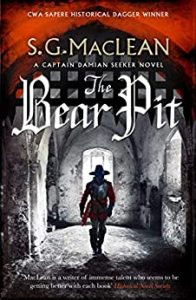 The Bear Pit, S. G. MacLean, Quercus
The Bear Pit, S. G. MacLean, Quercus
Captain Damian Seeker – a trusted member of Oliver Cromwell’s guard – must once again step in when Cromwell finds himself the target of a ruthless assassin. Conspiracies against the Lord Protector are once again on the rise, and there are many who would stop at nothing to see Charles Stuart restored to the throne. Meanwhile, Seeker is also faced with an illegal gambling den and the body of a man savaged by a bear. Yet it was believed that all bears were shot when Cromwell banned bearbaiting – so where did this one come from?
As Seeker investigates further, the two cases start to converge, and he begins to realise the magnitude of the treacherous forces that threaten the realm…
Click here to find out more about The Bear Pit
The Anarchists’ Club, Alex Reeve, Raven Books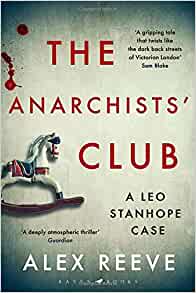
Following on from The House on Half Moon Street, The Anarchists’ Club leads us back into the dark underbelly of Victorian London. Determined to live his truth while maintaining his freedom and safety, pharmacist Leo Stanhope is doing his best to move on from the trauma and heartbreak of the past. But then a woman is found murdered at a club for anarchists – and she’s carrying Leo’s address in her purse. When Leo arrives at the club under police escort, he is dismayed to see an unwelcome face from his distant past – a man intent on blackmailing him for an alibi.
And now Leo must make a painful choice – risk having his lifelong secret exposed, or protect a possible murderer in exchange for his silence…
Click here to find out more about The Anarchists’ Club
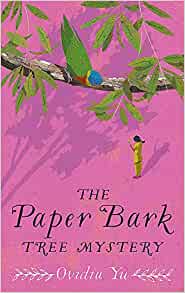 The Paper Bark Tree Mystery, Ovidia Yu, Constable
The Paper Bark Tree Mystery, Ovidia Yu, Constable
The Paper Bark Tree Mystery is the third book in Ovidia Yu’s page-turning Crown Colony series, set in 1930s Singapore. Su Lin has landed a job as an assistant at Singapore’s new detective agency. But her dream role is cut short when Englishman Bernard ‘Bald Bernie’ Hemsworth decides that a ‘local girl’ can’t be trusted with the agency’s investigations. Su Lin therefore loses her job and is replaced with a privileged white girl. Soon after, Bernie – widely disliked – is found dead in the filing room. And when the father of her best friend is accused, Su Lin is determined to prove his innocence.
During the course of her investigations, Su Lin uncovers stolen diamonds and treacherous arms deals. And it seems that the closer she gets to the truth, the more danger she is in…
Click here to find out more about The Paper Bark Tree Mystery
Stephen Taylor is the author of A CANOPY OF STARS, a thrilling historical 19th century saga stretching from the legal courts of Georgian London to the Jewish ghetto in Frankfurt.
Hi Stephen! Welcome to the Sapere Books blog. Could you tell us a bit about what first got you into writing?
My addiction has been with me for over twenty years now. When I was younger, if somebody told me a good joke, when I retold it it was twice as long, embellished, the story enhanced, the characters fleshed out. With me, it was never just about and Englishmen, an Irishman, and a Scotsman. It was an Englishman in a bowler hat with a monocle, an Irishman in a donkey jacket with a pint of Guinness and a Scotsman in a kilt with a set of bagpipes (and yes I know that this is stereotypical).
Tell us about where you write and your writing habits.
I started by writing during my lunchtime at work, but now I write in my home office. I keep a working week, Monday to Friday and write for two and a half hours a day. I seem to need that discipline.
What part of the writing process do you find most difficult?
Probably research: it’s a double edged sword — part good, part tiresome. The rewrites are also tricky, as you can edit forever, endlessly trying to improve what you have written. I aim to stop after five rewrites.
Do your characters ever seem to control their own storyline?
The received wisdom is that you determine your storyline and not let your characters deviate from that. However, after I develop my characters, they tell me where they want to go, what they want to do. I follow them, and my stories are character led. I still have a structure in my mind — A to B, but the characters say how I get there.
Do you find it hard to know when to end a story?
Not usually. I have a prompt to myself that sits just below the line I am typing. It reminds me to keep some control over the characters. It says: INTRIGUE — CONFLICT — CLIMAX — RESOLUTION. i.e:
Open with a big question or hook: INTRIGUE. Then you have the problems your hero is up against: CONFLICT. This builds to a CLIMAX. This is followed by the RESOLUTION.
What is your favourite book?
If you ask me this next week, you may get a different answer. I would say my favourite book is To Kill a Mockingbird by Harper Lee. My favourite character is Uriah Heep, from David Copperfield. Dickens’ image of him is wonderfully unpleasant — he’s so slimy.
What book do you wish you had written?
Anything by Norman Mailer. As a writer, he is so far above me. He’s much more than a storyteller.
Tell us something surprising about you.
I was brought up in Manchester, but I was born in Yorkshire. My mother traveled back to Yorkshire so that my birth there would give me residential status to play cricket for Yorkshire — nobody ever believes that, but I promise that it’s true. Unfortunately, it was a feat that I never achieved, the White Rose County being unappreciative of my cricketing skills.
Preorder A CANOPY OF STARS here!
Sign up to our newsletter for deals and new releases.
We recently had a digital meet-up with some of our authors to catch up on current projects and find out how lockdown has impacted their writing. Read on to find out more about their creative news and practices:
Elizabeth Bailey has published six Lady Fan Mysteries, four Brides By Chance Regency Adventures, and two more historical romances. She is working on her seventh Lady Fan book. Elizabeth has also been taking daily walks, giving digital readings, and maintaining her weekly newsletter, which is filled with writing updates and giveaways.
Graham Brack has published six Josef Slonský Investigations and two Master Mercurius Mysteries. He is working on the next books in both series. Graham finds that working on two series simultaneously helps prevent him developing writers’ block with either one.
Jane Cable has published one contemporary romantic saga drawing on World War II, and her second – Endless Skies – is forthcoming. Jane has been developing a new website, editing Endless Skies, and working on a new contemporary romance novel.
Tim Chant has a Russian-Japanese naval novel forthcoming and has started the next one. He is also writing and self-publishing science-fiction and steampunk novellas.
 Michael Fowler has published five DS Hunter Kerr Investigations. He is currently working on a new series, developing a character who is a forensic psychologist. As part of this, Michael is researching various forensic technologies and has spoken to an expert in the field.
Michael Fowler has published five DS Hunter Kerr Investigations. He is currently working on a new series, developing a character who is a forensic psychologist. As part of this, Michael is researching various forensic technologies and has spoken to an expert in the field.
Justin Fox has two nautical novels forthcoming with Sapere Books. These are also being published in South Africa by Penguin Random House and are currently being edited.
Anthony Galvin (who also writes as Dean Carson) is the author of historical non-fiction book Death and Destruction on the Thames in London. He is working on a series of thrillers. As a mature student, Anthony has also been finishing up assignments and exams.
Sean Gibbons’ gritty crime series – following taxi driver Ben Miller – will be published in 2021. He is currently writing the fourth book in the series and has just finished a World War II espionage thriller.
Gillian Jackson has published three psychological thrillers. She is now editing old and self-published work, finding ways to re-purpose old characters. Gillian is particularly interested in developing more contemporary women’s fiction with a psychological element.
Natalie Kleinman has four Regency romances signed up and has written two more. She has recently made a start on a new romantic novel.
Simon Michael has published five Charles Holborne Legal Thrillers, and he has a sixth one lined up. Aside from writing, he has recently been busy with building work.
Ros Rendle has six romance novels forthcoming with Sapere Books, including her Strong Sisters trilogy. Ros has recently finished a new novel, and she has found her Chapter writing group (regional groups of romance writers affiliated with the Romantic Novelists Association) a great source of support.
Linda Stratmann has published five Mina Scarletti Mysteries and is writing the sixth. To help with this, she has been researching Victorian spirit photography using Archive.org. Linda has also been gardening, cooking, baking, and holding digital meetings with the Crime Writers’ Association, of which she is the chair.
Deborah Swift has published two romantic World War II sagas and is working on the third, which will be set in Shetland and Norway. She has been researching nautical terminology and walking a lot, which she finds is a great time to think about plot.
Alexandra Walsh has published three timeshift conspiracy thrillers; the last one, The Arbella Stuart Conspiracy, came out in May. She is now writing a Victorian dual-timeline novel and is planning to start a newsletter.

This summer, settle down with a charming, classic love story by Lewis Cox – a master of the genre!
ONE SPRING IN PARIS follows Caroline May, a young artist studying her craft in the city of love. When her money runs out, she resolves to find a way to remain in the place that inspires her most. Through friends, she finds work with melancholy restauranteur Raoul Pierre. As soon as they meet, Caroline finds herself irresistibly drawn to her new employer. But knowing that Raoul is a determined bachelor, she vows to hide her feelings to protect her heart…
Click here to order ONE SPRING IN PARIS
 THE WAYWARD WIND is a fun and flirty summer romance set in sunny Madeira. Fleeing a London scandal that has damaged her reputation, the capricious Ann Thrail arrives at her aunt and uncle’s idyllic home in Portugal for a long stay. But her aunt, Kate, soon begins to worry that Ann will lead her son astray. With no wish to return home, Ann must learn to rein in her chaotic nature and win over her anxious relatives…
THE WAYWARD WIND is a fun and flirty summer romance set in sunny Madeira. Fleeing a London scandal that has damaged her reputation, the capricious Ann Thrail arrives at her aunt and uncle’s idyllic home in Portugal for a long stay. But her aunt, Kate, soon begins to worry that Ann will lead her son astray. With no wish to return home, Ann must learn to rein in her chaotic nature and win over her anxious relatives…
Click here to order THE WAYWARD WIND
WHILE STARS GAZE DOWN is a beautiful story of healing and new beginnings. Nursing a recently broken heart, Diana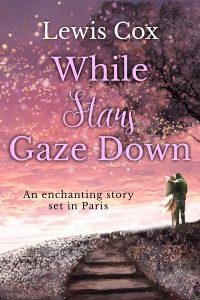 Gregg attempts to move on by immersing herself in the delights of Parisian society. But when she crosses paths with John Fanshawe — who reminds her of her ex-boyfriend — she decides to protect herself from further pain by maintaining a distance between them. Confused by Diana’s reserved attitude, John is determined to overcome her apparent dislike…
Gregg attempts to move on by immersing herself in the delights of Parisian society. But when she crosses paths with John Fanshawe — who reminds her of her ex-boyfriend — she decides to protect herself from further pain by maintaining a distance between them. Confused by Diana’s reserved attitude, John is determined to overcome her apparent dislike…
Click here to order WHILE STARS GAZE DOWN
To further celebrate her work, we asked Lewis Cox’s granddaughter, Priscilla Playford, to say a few words about her life and achievements:
“My grandmother wrote over 250 novels all in longhand; she started her career in the late 1920s and continued writing well into her 80s. She wrote under the names of Lewis Cox, Bridget Parsons and Mary Blair, and her books were published, primarily, by Hutchinson, Mills & Boon and later, Robert Hale. They were available in many countries and translated into several languages, including Japanese and Dutch.
In her writing, as in life, my grandmother was very disciplined and forthright with a strong will and high standards. Not outgoing, she did not seek publicity but enjoyed her success and, whilst not a traveller, it is perhaps true that she lived through her imagination. She loved antiques and enjoyed collecting furniture and pictures.
One cannot help but admire all that she achieved, particularly at a time when women were expected to be in the background — hence her using the name ‘Lewis Cox’ — and during the war; judging by the cuttings, she was very highly thought of and had good reviews and billing.”
We had very sad news back in April that one of our authors, Alan Williams, fell victim to COVID-19. He passed away in a care home, aged 84.
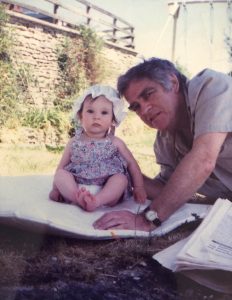
Alan with his daughter, Sophie
Williams graduated from King’s College, Cambridge, in 1957 with a BA in Modern Languages. He then led a rich and varied life as a journalist and foreign correspondent, working for publications such as the Cardiff Western Mail and the Manchester Guardian. He reported on a number of world events, including the Hungarian Revolution, the Algerian War and the Vietnam War.
His experiences as a reporter later influenced his novel writing. Barbouze – the first instalment of Williams’ Charles Pol Espionage Thriller series – follows a British journalist who accompanies a French spy on a mission in North Africa. A later novel in the series, The Tale of the Lazy Dog, is a heist story set in Southeast Asia. Williams’ writing won him much acclaim: he has been described as “the natural heir to Ian Fleming” and “one of the important figures in the change and development of the espionage novel”.
Williams has three children – Sophie, Owen and Laura – and three grandchildren, Roxy, Willow and Fox. Our thoughts are with his family at this difficult time.
You can read Alan Williams’ full obituary in the Guardian.
Photographs courtesy of Sophie and Laura.
Sapere Books are proud to be sponsoring the Crime Writers’ Association’s Historical Dagger Award, which is for the best historical crime novel set in any period at least 50 years prior to the year in which the prize is presented.
This year’s judges were Janet Laurence, the author of four cookery books and a series of articles on historical cookery; Angela May Rippon CBE, a television journalist, newsreader, writer and presenter; Professor Edward James, Emeritus Professor of Medieval History at University College Dublin; and Andre Paine, former editor of Crime Scene magazine.
The 2020 longlist has now been announced. Congratulations to the following authors and publishers:
THE MAN THAT GOT AWAY by Lynne Truss, Raven Books
THE KING’S EVIL by Andrew Taylor, Harper Collins
THE BEAR PIT by SG MacLean, Quercus Fiction
THE ANARCHISTS’ CLUB by Alex Reeve, Raven Books
METROPOLIS by Philip Kerr, Quercus Fiction
THE PAPER BARK TREE MYSTERY by Ovidia Yu, Constable
THE SERPENT’S MARK by SW Perry, Corvus
IN TWO MINDS by Alis Hawkins, The Dome Press
LIBERATION SQUARE by Gareth Rubin, Michael Joseph
THE BONE FIRE by SD Sykes, Hodder & Stoughton
SORRY FOR THE DEAD by Nicola Upson, Faber & Faber
DEATH IN THE EAST by Abir Mukherjee, Harvill Secker
We are thrilled to announce that we have recently welcomed three brilliant new authors to our contemporary romance and historical fiction lists. We look forward to sharing their wonderful work with the world!
Tim Chant is working on an exciting historical naval thriller series. The first instalment – THE STRAITS OF TSUSHIMA – is set in 1905 during the Russo-Japanese war and follows the daring exploits of Marcus Baxter, a British Royal Navy officer turned spy.
THE STRAITS OF TSUSHIMA is due out in 2021.

Teresa F Morgan is working on a fabulous three-book contemporary romance series. Set in Cornwall, her novels have a strong sense of place and a unique sunny charm. Her first book, COCKTAILS AT KITTIWAKE COVE, sees ambitious restauranteur Rhianna Price arrive in the area looking for a fresh start. But when she runs into her holiday fling, Rhianna’s focus is put to the test…
COCKTAILS AT KITTIWAKE COVE is due out in 2021.
Tanya Jean Russell writes heart-warming romantic fiction. Her first book will be a seasonal novel called AN IMPERFECT  CHRISTMAS, a moving and uplifting tale that follows Maggie Green, a young accountant who returns to her hometown and is forced to face her first love.
CHRISTMAS, a moving and uplifting tale that follows Maggie Green, a young accountant who returns to her hometown and is forced to face her first love.
AN IMPERFECT CHRISTMAS will be published in late 2020.
Linda Stratmann is the author of the MINA SCARLETTI INVESTIGATIONS, a traditional British detective series set in Victorian Brighton.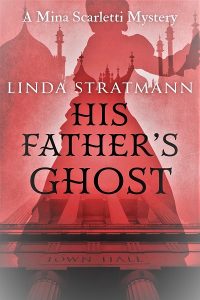
More than a year ago, I determined to write a book in which Mina Scarletti, disabled by the scoliosis that twists her spine and cramps her lungs, is taken ill and solves a mystery while confined to bed. It is not a new concept. In The Wench is Dead, Inspector Morse solves a Victorian murder while in hospital, and in Josephine Tey’s The Daughter of Time, Inspector Alan Grant, hospitalised with a broken leg, explores the fate of the Princes in the Tower.
But these are historical puzzles, and therefore considered suitable to engage the mind of a bored invalid. In His Father’s Ghost, Mina has additional challenges. She is intrigued by a current conundrum, the disappearance of a local man while out sailing, declared legally dead, but his actual fate unknown. Her doctor, however, has advised her against any activity that might tax her delicate health, and that includes solving mysteries. She has to use all her ingenuity to gather the information she needs. In doing so, she finds that she has uncovered evidence of past crimes and scandals. Her enquiries are a catalyst that set off a train of events that ultimately have dramatic and life-changing consequences for several prominent citizens of Brighton.
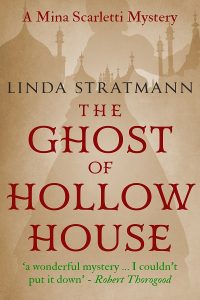 One of the themes which I explore in this book is hallucination. Mina, when stricken by a fever, sees and hears things that reveal what is troubling her. The son of the vanished man, disturbed by significant events, has terrifying visions in those dark hours that lie between sleeping and waking.
One of the themes which I explore in this book is hallucination. Mina, when stricken by a fever, sees and hears things that reveal what is troubling her. The son of the vanished man, disturbed by significant events, has terrifying visions in those dark hours that lie between sleeping and waking.
I really enjoyed my research for this book. I visited the fascinating Police Cells Museum of Brighton, and read about the curious spiritoscope, an apparatus designed to prove that it was spirits and not the medium who cause the movement of the divination table.
It was my real pleasure to include two characters who have appeared in previous books, the flamboyant actor Marcus Merridew, fresh from his acclaimed season as Hamlet, and the creepy young photographer Mr Beckler.
While editing the manuscript, which was completed at the end of 2019, I was struck by how Mina’s plight echoes our current time. She is ill with a lung infection, and effectively on lockdown. But when she scents a puzzle, it gives her strength. She needs not only warmth and air and nourishment, but material to keep her busy mind alive.
Click here to pre-order HIS FATHER’S GHOST
To help keep you entertained during quarantine we’ve put together a list of some of our most absorbing thrillers, featuring mysterious disappearances, historical conspiracies, ghostly dreams and more…
A compelling timeshift mystery, Paternoster moves between 18th Century and modern-day England. In 1795, kept woman Rachel Lovett is left homeless and destitute when her benefactor loses his money. Forced to steal jewellery to survive, Rachel finds herself constantly on the run from the law and the hangman’s noose. And when she joins a brothel, she is soon introduced into the ruthless Paternoster Club…
In 2013, Private Investigator Eden Grey is called in to examine a pair of skeletons found in the grounds of a prestigious school. It soon becomes obvious that these are not recent murders – the bodies have been buried for centuries. And now Eden must unravel a historic mystery while concealing her own personal demons…
Click here to order Paternoster
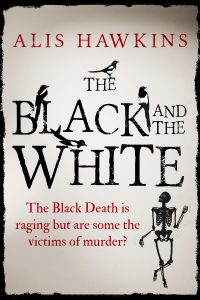 The Black and the White, Alis Hawkins
The Black and the White, Alis Hawkins
Set in 1349, The Black and the White is a chilling medieval mystery that explores the ravages of the infamous Black Death. Martin Collyer wakes up in his family’s charcoaling hut, having made a miraculous recovery. But his father, who showed no signs of the plague, is dead.
With no home to go to, Martin seizes his second chance at life and goes on a journey to seek salvation for his father’s unconfessed soul. Along the way, he befriends another traveller, the enigmatic Hob Cleve. But when more suspicious deaths occur, Martin begins to wonder whether he is travelling with a killer…
Click here to order The Black and the White
Abduction is an emotional psychological thriller that confronts every parent’s worst nightmare. During her third birthday party, little Grace disappears without a trace while playing a game of hide and seek.
As the years go by and the case goes cold, Grace’s parents lose hope of ever finding her and do their best to move on with their lives. But her older sister, Elise, refuses to give up. And a chance encounter leads her to believe that she may have found her…
Spanning three decades, Past Imperfect is a gripping international crime novel with a paranormal twist. In 1963, a boy is kidnapped and murdered in the French countryside. The killer is seemingly caught, but young policeman Dominic Fornier is convinced he is innocent.
In London thirty years later, a boy loses his parents in a car accident and is left comatose. And when he regains consciousness, he is plagued by eerie dreams of a life that isn’t his. When Fornier hears of a possible link between the two boys, he throws himself into a desperate race against time to catch a brutal killer and right the wrongs of the past…
Click here to order Past Imperfect
The Catherine Howard Conspiracy, Alexandra Walsh
The Catherine Howard Conspiracy is an absorbing dual timeline conspiracy thriller with a shocking twist on Tudor history. In 1539, young Catherine Howard is brought to the court of King Henry VIII to be a lady in waiting to the new queen, Ann of Cleves. But when she catches the king’s eye, her uncle begins scheming to secure a Howard heir to the throne. After the fate that befell her cousin, Anne Boleyn, Catherine is terrified of the unpredictable king and begins to fear for her life.
In 2018, Perdita and Piper Rivers inherit Marquess House from their estranged grandmother, renowned Tudor historian Mary Fitzroy. When Perdita sets out to uncover Mary’s reasons for abandoning them, she is drawn into the mysterious archives of Marquess House: a collection of letters and diaries that claim all records of Catherine Howard’s execution were falsified…
Click here to order The Catherine Howard Conspiracy
Like the look of these thrilling reads? Sign up to the Sapere Books newsletter for new releases and deals in crime and thriller fiction.
Jane Cable is the author of ANOTHER YOU and ENDLESS SKIES, modern romantic sagas that draw on the Second World War.
Although I hated history at school, in my adult life I have become a total history buff. Not history about royalty, wars and politicians though – the history of ordinary, everyday people. A history I feel connected to and is more often than not local.
For my contemporary romances the history I choose is sharply focussed, linked to the setting. For Another You, the most gripping part of Studland’s past was its role in the practices for D-Day, and for Endless Skies I decided to stay with World War Two. The book is set in Lincolnshire, so to my mind is inextricably linked with Bomber Command.
The wartime setting for Endless Skies is RAF Hemswell, now an industrial estate best known for its antiques centres and markets. In fact, that was the reason I went there in the first place. But wandering around the old barrack buildings, I could almost see the airmen on the stairs and hear the stamp of their boots in the parade ground. This had to be the place.
 The staff at Hemswell Antique Centres were able to give me a leaflet with a short history of the base, and that set me off on my research. While we were in Lincolnshire I walked its buildings and roads then drove around the area, so I was totally familiar with the terrain, and once we were back at home I started to dig deeper.
The staff at Hemswell Antique Centres were able to give me a leaflet with a short history of the base, and that set me off on my research. While we were in Lincolnshire I walked its buildings and roads then drove around the area, so I was totally familiar with the terrain, and once we were back at home I started to dig deeper.
Here the internet is invaluable, and there are a number of websites giving the history of RAF bases. Hemswell was one of the first to be operational right at the beginning of the war, but as I dug deeper I found two Polish squadrons had been based there in 1942-3 and had suffered huge losses. I knew exactly where to focus my research.
This is where local history becomes exceptionally localised for me: one place at one point in time. In Endless Skies my protagonist, Dr Rachel Ward, is an archaeologist and my own work made me think of hers: researching a site, carrying out a survey, opening a trench, trowelling into every corner then digging out a single artefact. She finds … well, it would be spoiling the story to tell you. I find words.

Hemswell War Memorial
But sometimes before you focus down you need to pan out, so I read around the subject: first-hand accounts from wartime bomber crews; memoirs of civilian life on RAF bases. For background on Hemswell itself I was very lucky – it was where The Dam Busters was filmed in the 1950s, and there was both a book and documentary about making the movie so I could watch almost contemporary footage.
There was also a treasure trove on the internet about the Polish airmen who crewed the station, and seeing photographs of them was quite an eerie experience. In fact, I ended up with far more information than I could possibly – or would want to – use in the book. But the level of detail gives me confidence my historical details are correct.
But equally interesting to me were the ghost stories associated with Hemswell: a pilot in flames on the runway, the echoes of 1940s music and the sounds of bombers taking off and landing. And having researched them, it would have been such a shame not to use at least one of them as well. Although my ghosts, of course, are completely fictional.
Click here to order ANOTHER YOU.
Click here to pre-order ENDLESS SKIES.
Keith Moray is the author of the SANDAL CASTLE MEDIEVAL THRILLERS, historical murder mysteries set in Yorkshire. The first two books in the series, THE PARDONER’S CRIME and THE FOOL’S FOLLY, are available to pre-order.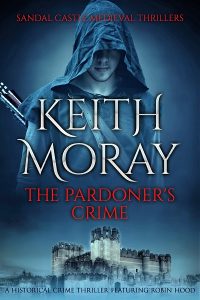
I live within arrowshot of the ruins of Sandal Castle. As a family doctor in Yorkshire, for thirty years I saw it most days while driving around the area on my morning visits. Nowadays, in semi-retirement I go running around the old battlefield where thousands of knights and soldiers once fought and died during the Wars of the Roses.
I plot and daydream when I run. Happily, a short story entitled The Villain’s Tale about a miscreant in a rat-infested dungeon in Sandal Castle won a Fish Award. It spurred me on to start plotting the Sandal Castle Medieval Thrillers.
Sandal Castle
The fine old motte and bailey was built in the 12th century by the De Warenne family during the reign of Henry I. From the 14th century it passed into royal ownership and is best known for its involvement in the Battle of Wakefield in 1460, when Richard, Duke of York was mortally wounded. His son, King Edward IV established it as one of the two bases for the Council of the North in 1472. Effectively, this was the government for the North of England. After he died, his younger brother, King Richard III began rebuilding the castle in 1483. The work stopped when he lost his life at Bosworth Field in 1485.
Thanks to television and movies, most people associate the outlaw Robin Hood with Sherwood Forest and Nottingham. However, the medieval ballads say that his stomping ground was actually Barnsdale Forest, which once covered a vast swathe of Yorkshire. The ballads also mention King Edward and various Yorkshire characters, such as George-a-Green the Pinder of Wakefield, and many actual locations in Wakefield are referred to.
The Court Rolls of the Manor of Wakefield
In medieval times, The Manor of Wakefield was the largest in Yorkshire and one of the largest in England, covering some 150 square miles. The Court Rolls of the Manor of Wakefield are a national treasure, consisting of a continuous recording of court proceedings from the late thirteenth century until the 1920s.
The outlaw and bowman Robert Hode, a sure candidate for being the historical Robin Hood, is mentioned in the Court Rolls of 1316.
The Sandal Castle Medieval Thrillers
 If you look at the picture of Sandal Castle today you will see exactly where I had the germ of the idea for The Pardoner’s Crime, the first novel in this series. It is a view of the castle from under what I fancifully call Robin Hood’s tree. I blended historical facts, medieval ballads and a good deal of imagination to come up with a historical whodunit.
If you look at the picture of Sandal Castle today you will see exactly where I had the germ of the idea for The Pardoner’s Crime, the first novel in this series. It is a view of the castle from under what I fancifully call Robin Hood’s tree. I blended historical facts, medieval ballads and a good deal of imagination to come up with a historical whodunit.
There are three completed novels and a fourth in the pipeline. They are not all about the same characters; indeed they are set at different times, because Sandal Castle with its fascinating history is the historical backdrop to them. They are all inspired by Chaucer’s The Canterbury Tales and some of the characters that he described so beautifully. The Pardoner’s Crime fuses The Canterbury Tales with the Robin Hood legends. The reader is challenged to uncover the true villain in each novel.
Click here to pre-order THE PARDONER’S CRIME.
Click here to pre-order THE FOOL’S FOLLY.
Sandal Castle image credit: Keith Moray
David Field is the author of the Carlyle & West Victorian Mysteries.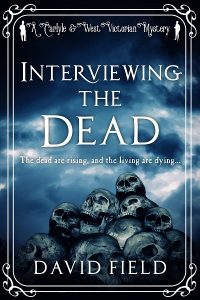
As a historical novelist in search of bygone eras to recreate, I’ve always been fascinated by the late Victorian period. It was a time of contrasts, with vast scientific, medical and technological breakthroughs coming at a time when ordinary folk were obsessed with communicating with the dead. Victoria seemed destined to rule forever over a rich empire, while her subjects in its industrial cities, and most notably in its London capital, were existing in conditions of abject poverty.
Following the success of my Esther & Jack Enright mystery series, which began with the search for Jack the Ripper and ended just as the nineteenth century was about to, I was urged to return to this rich seam of inspiration, and there was – for me, at least – one obvious place to start.
When Arthur Conan Doyle abandoned medical practice and created his fascinating character Sherlock Holmes, he was inspired by his memory of a real life Sherlock. His name was Dr Joseph Bell, and he had taught anatomy to his classes of medical students at Edinburgh University, one of whom had been Doyle himself. Bell had what was then a unique approach to his analysis of the cadavers that were to be found on his mortuary slab, something that is second nature to modern forensic examiners, but was revolutionary in its day. He approached ‘cause of death’ by examining, not just insides of the bodies, but the clothing and personal possessions with which they arrived, and telltale indications on the skin, such as needle marks, abrasions, rough working hands and suchlike. From this he made logical deductions that were of value to police in unexplained death enquiries, and he taught his students to apply the same techniques when they went out into the world.
There must have been several generations of medical graduates from Edinburgh who were taught ‘the Bell method’, and it was no great stretch of the imagination for me to create Dr James Carlyle, anatomist and general surgeon at Whitechapel’s London Hospital – a medical doctor with the same professional training as Conan Doyle and the same inquisitive, logical mind as Joseph Bell.
His first challenge – described in the first novel in my new series, INTERVIEWING THE DEAD – is to debunk the panicked belief among the populace of the East End that the spirits of those buried in a Plague Pit in Aldgate have returned to take their revenge for the disturbance of their resting place. That belief has taken hold easily, given the obsession with Spiritualism that gripped the country during this period.
But there were also other ‘spirits’ abroad, and they were advocating for great social change. Chief among these were the Suffragists, who campaigned for ‘votes for women’ and Suffragettes who took on entire police forces in public demonstrations. There were also other groups of feminists, as we would call them today, who advocated for equality of admission to professions such as medicine and the law. This was how Dr James Carlyle’s daughter, Adelaide, was created, as a young woman whose opinion of men and their dominance of society could not have been any lower – until she meets my third new character, Matthew West.
Although the Anglican Church was ahead of all other Protestant movements in the 1890s, it was demonstrating a social elitism that drove away ordinary working folk, and left the pastoral door open for more working-class religious initiatives and crusades among the poor. ‘Methodism’ had become a religious movement of its own, with its own hierarchy, but its progenitor, ‘Wesleyism’, still had its head above the parapet, and Wesleyan street preachers such as Matthew West might be found on corners, in market places, and outside factory and dockside gates.
Matthew has his own reasons for wishing to hose down any belief in the return of vengeful spirits of the dead, and when he finds himself associated with Dr Carlyle in the search for the truth, he comes up against the fiery Adelaide, who works as her father’s assistant. They influence each other’s views on life as they are drawn imperceptibly into a mutual attraction.
The stage is set for my next series. I hope you’ll join me in following the exploits of this unlikely trio, and I look forward to learning your reaction to them.
Click here to pre-order INTERVIEWING THE DEAD!
Sapere Books has reached its second birthday!
We now have a family of over 50 authors and plenty of chart successes under our belt.
To celebrate our first two years as a company, we threw a party in London and caught up with our fabulous authors over drinks and nibbles. All have exciting new projects brewing. Here is a taster of what to expect from our authors in 2020.

Alexandra Walsh and Graham Brack
Graham Brack is working on a historical fiction series, the Master Mercurius Mysteries, set in the 17th century. The first book, Death in Delft is already available to pre-order, and more will follow later this year.
Keith Moray has written the Sandal Castle Medieval Thriller series, historical murder mysteries set in Yorkshire. The first book, The Pardoner’s Crime, is available to pre-order, and more are soon to follow.
Alis Hawkins’ brand-new Medieval novel The Black and The White will be published later this month.
David Field is working on a brand-new Victorian mystery series, the Carlyle & West Mysteries, which will launch very soon.
Jane Cable has another thought-provoking romance with echoes of the past launching soon.

Stephen Taylor, Caoimhe O’Brien, and Keith Moray
Gillian Jackson has written a new psychological thriller, which will be released this summer.
Natalie Kleinman will be joining our excellent Regency Romance authors with her sparkling new books, which will feature strong and resourceful heroines.
Ros Rendle will be launching her Strong Sisters series this year – sweeping sagas that will explore family relationships and rivalries.
Seán Gibbons’ gritty urban crime series set in Galway will launch later this year.

J. C. Briggs and Linda Stratmann
Stephen Taylor has a series of 18th century novels coming out soon.
And there are new books coming out soon from fan-favourite series, such as Alexandra Walsh’s Marquess House Trilogy, Elizabeth Bailey’s Lady Fan series, J C Briggs’ Charles Dickens Investigations series, Gaynor Torrance’s DI Jemima Huxley series, Charlie Garratt’s Inspector Given series, Michael Fowler’s DS Hunter Kerr series, Valerie Holmes’ Yorkshire Saga series, Marilyn Todd’s Julia McAllister series, Simon Michael’s Charles Holborne series, John Matthews’ Jameson & Argenti series and Linda Stratmann’s Mina Scarletti series.
For more information on our latest releases and ebook deals sign up to the Sapere Books newsletter.
To celebrate International Women’s Day (8th March) we asked five of our authors to tell us all about their favourite female writers. Read on to find out more about their literary heroines!
Alis Hawkins, author of The Black and the White and Testament
My all-time favourite author is Joanna Trollope. An odd choice for a crime author? Not at all. Wonderful writing transcends genre, and she inspires me by drawing characters with a fine eye to dialogue and interaction; by bringing whole scenes to life with a few telling details; by making her readers care passionately about what happens to her characters.
Joanna Trollope has shown me how essential it is to do your research meticulously, to immerse your readers in the world you’re writing about – whether it’s a cathedral close or a dairy farm, a ceramics factory or a Spanish vineyard – but never to include a single unnecessary fact that might slow the action down.
Each Joanna Trollope novel begins with a single key event that turns the lives of all her interrelated characters upside down – and what else does a murder at the beginning of a book do but that?
Order THE BLACK AND THE WHITE here
M. J. Logue, author of the Thomazine and Major Russell Thrillers
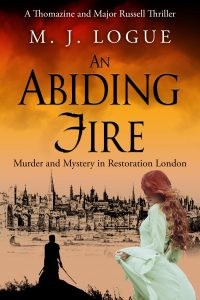 My busy little mind raced over all the possibilities – Tanith Lee, Storm Constantine, Dorothy Dunnett, Helen Hollick … but there can be only one, for me. Aphra Behn, of course. It’s not the what or the how of her writing, but the enigma and the old-school glamour of the writing persona she created – the international woman of mystery, the myths with which she surrounded herself – that inspires me. (Three hundred and fifty years later, she’s still a mystery!)
My busy little mind raced over all the possibilities – Tanith Lee, Storm Constantine, Dorothy Dunnett, Helen Hollick … but there can be only one, for me. Aphra Behn, of course. It’s not the what or the how of her writing, but the enigma and the old-school glamour of the writing persona she created – the international woman of mystery, the myths with which she surrounded herself – that inspires me. (Three hundred and fifty years later, she’s still a mystery!)
She was the first female literary professional, she did all her own publicity, and she’s still incredible. Possibly a spy, possibly bisexual – both, I suspect, images she manipulated to the hilt – and definitely a woman who knew how to work an audience. The fact that her plays and poems still resonate with us now is remarkable. She created characters that speak to us, no matter what clothes they’re wearing.
Or find out more about the Thomazine and Major Russell Thrillers here
Deborah Swift, author of Past Encounters and The Occupation
The first Rosie Tremain novel I read was Music and Silence, set in the Danish court in the early 17th Century. Marvellously atmospheric, it shifts between different narrative styles: small vignettes that add up to a magnified version of life in Copenhagen that is so real, you feel you are there.
I’ve read all her other books since, including the more contemporary The Road Home, about an economic migrant arriving in the UK, who observes with bafflement the English obsession with status and success. I admire Tremain’s precision, and that is something I want to achieve in my own writing.
Gaynor Torrance, author of the DI Jemima Huxley Thrillers
 I write in the genre I love to read, and being an avid reader of crime fiction, there are so many female authors whose work I admire. A particular favourite of mine is Sophie Hannah. I first stumbled across her books by chance, when I borrowed a copy of Little Face from my local library. Once I started reading, I couldn’t put it down.
I write in the genre I love to read, and being an avid reader of crime fiction, there are so many female authors whose work I admire. A particular favourite of mine is Sophie Hannah. I first stumbled across her books by chance, when I borrowed a copy of Little Face from my local library. Once I started reading, I couldn’t put it down.
Since finishing that particular book, I’ve worked my way through much of the Culver Valley Crime series. I adore the originality and complexity of Sophie’s plots, which have lashings of intrigue and misdirection. The central characters, DS Charlie Zailer and DC Simon Waterhouse, are such a great pairing. They’re both so dysfunctional and vulnerable in many ways, yet somehow form a compelling and likeable team.
Or find out more about the DI Jemima Huxley Thrillers here
Alexandra Walsh, author of The Marquess House Trilogy
She may be old-fashioned, and her comments can make me wince, but take away the occasionally dubious contents of a bygone era and Enid Blyton remains a huge inspiration with the breadth of her storytelling skill. In her adventure books, her plotting is deft and sharp, while in her fantasy books her imagination is broad and tantalising.
As a child, she shaped my reading habits but my eureka moment came when I was reading In the Fifth at Malory Towers. I was already harbouring ambitions to be a writer, but it was only a dream. Then, the heroine of the series, Darrell Rivers, wrote the school pantomime. Suddenly, I thought, If Darrell can do it, then so can I! My life path was set. From reading Enid Blyton’s work, I learned that girls were stronger and more effective if they worked together, that girls could do as much as boys and usually more, and that if you were determined you could solve anything – lessons that still resonate today.
Order THE CATHERINE HOWARD CONSPIRACY here
Or find out more about The Marquess House Trilogy here
DEATH IN DELFT by Graham Brack is the first historical murder investigation in the Master Mercurius Mystery series: atmospheric crime thrillers set in seventeenth-century Europe. Click here to pre-order.
Most crime writers have a keen sense of place. Something about a setting grabs them and tells them there is a story here.
So it was with me. When you live in Cornwall, the quickest place to get to on the continent is Amsterdam, because there is a flight from Exeter, so over the years my wife and I have been frequent visitors to the Netherlands.
The first place we went was Delft. As is well known, Delft is the city of Vermeer; but it is also the city of Antony van Leeuwenhoek, the father of modern microscopy. Not only did they live within around 250 metres of each other, they were born within a few days of October 1632. Can you imagine being a schoolteacher who had two such boys in their class?
I was turning this around in my mind when the idea came to me that people often ask whether detection is an art or a science. Well, if these two could not tell you, who could? Making them into detectives in their own right would be a bit of a stretch, but they could vie to assist a third person, and that’s how my Dutch series was born.
In the year 1671, three young girls disappear from their homes in Delft. Two come from poor families, but one is the daughter of a local dignitary. The mayor recognises that he needs help to find these girls, and writes to the nearby University of Leiden, asking the Rector to send the cleverest man he can spare.
Master Mercurius is undoubtedly clever. He is, in effect, an Oxbridge don transported to another time and country, but like many an academic he is completely wrapped up in his subject – moral philosophy – and has very little experience of the world. He does not want to let the Rector and the University down, but he is acutely aware that brains alone will not solve this mystery. Fortunately, he has Vermeer and Van Leeuwenhoek to help, and together they set out to retrieve the girls and discover the culprit. In a nutshell, that is how I came to write Death in Delft, in which Mercurius narrates – very frankly – his experiences.
I don’t think it counts as a spoiler if I say that he is successful and returns to his study with something of a reputation. Unfortunately for him, in 1674 the Stadhouder – the man we know as King William III – needs some assistance in putting down a conspiracy which seeks to remove him from power. It seems likely that someone in high places is pulling the strings, so William needs an intelligent outsider to look into the matter, and his gaze falls upon Mercurius, who is summoned from Leiden. In Untrue till Death Mercurius will find himself personally threatened – and since he is no man of action, he does not enjoy it at all.
However, success in unravelling this mystery only means that when William next needs help he thinks once more of Mercurius, so in 1676 our hero is packed off on a boat to London as part of the embassy negotiating the marriage of William III and Princess Mary. The trouble is that somebody does not want the wedding to go ahead, so in Dishonour and Obey Mercurius finds that there is more to marriage preparation than sitting down with the young couple to talk them through their vows.
Mercurius is a very reluctant detective, as he never tires of telling us. He likes nothing better than sitting quietly reading a book, ideally in a tavern where people leave him alone. As a man of the cloth, he has a strong moral sense but he is a bit squeamish about the punishments of the day. Of course, he knows that a couple of hours of misery on a scaffold are nothing compared with what awaits an unrepentant criminal in the next life, but he feels responsible for one and not for the other.
He also has no idea at all about women. He is not immune to their charms; in fact, he spends much of his time under the spell of young women, but Mercurius has a little secret.
And no, I’m not going to tell you what it is. You’ll have to read the books to find out.
Celebrate Valentine’s Day with a timeless love story! We’ve chosen four of our favourite romantic reads for you this February.
Summer at Hollyhock House, Cathy Wallace
After breaking up with her long-term boyfriend, Faith Coombes is looking for a new start. Her search leads her back to where she began: the village where she grew up, home to her best friend and an old flame. As the summer wears on, Faith finds solace in her familiar surroundings, and her feelings for the boy she once adored begin to rekindle. But as memories of hurt and heartbreak start to resurface, Faith must decide whether she can put the past behind her and give love a second chance.
A charming and heart-warming tale of missed opportunities, self-discovery and the bittersweet sting of true love, Summer at Hollyhock House is sure to bring both tears and laughter.
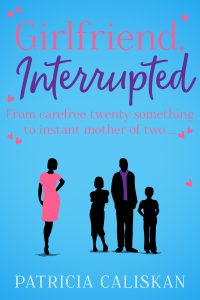 Girlfriend, Interrupted, Patricia Caliskan
Girlfriend, Interrupted, Patricia Caliskan
After a whirlwind romance, Ella Shawe takes the plunge and moves in with her boyfriend, Dan – plus his two children and pet dog. Far from domestic bliss, Ella must now learn to cope with a resistant family, a hellish mother-in-law and Dan’s impossibly perfect ex-wife. But with the future of her blossoming relationship on the line, Ella is determined to find a way to fit into the chaos…
Full of modern dilemmas and sparkling humour, Girlfriend, Interrupted is a fabulous British comedy with a spirited and relatable heroine at its heart.
Women Behaving Badly, Frances Garrood
Three very different women are all stuck with impossible romances: Alice has an irresponsible ex and a noncommittal lover; Mavis is having an affair with a father of two; and Gabs is a high-class escort who has fallen in love with someone she can never be with. In the eyes of the Catholic church, all three women have gone astray. But their priest, Father Cuthbert, is determined to reform them. As Alice, Mavis and Gabs form an unlikely friendship, each begin to question what is most important to them – and it soon becomes apparent that the lively trio can’t be ‘cured’ that easily…
Original, uplifting and fabulously witty, Women Behaving Badly is a moving tale of heartache, self-love and the warmth and power of female friendship.
Following the breakdown of her marriage, Marie is still learning to heal. But as the head chef of The Smugglers – the pub co-owned by her ex-husband – she finds herself constantly stretched and plagued by headaches. With local celebrations planned for the 60th anniversary of D-Day, Marie expects to be busier than ever – but she could never have prepared for the changes that are about to hit. Paxton, a charming American soldier, seems to be just what Marie is looking for: a bit of light-hearted fun. But as they grow closer, she begins to wonder if he is all that he seems…
Drawing on World War II history as well as the horrors of modern combat, Another You is a sweeping story of trauma, courage, and self-reclamation.
Like the look of these romantic reads? Sign up to the Sapere Books newsletter for new releases and deals in romantic fiction.
Sapere Books are proud to be sponsoring the Romantic Novelists’ Association’s Popular Fiction Award. Read on to find out more about this year’s sparkling shortlist!
The Glittering Hour, Iona Grey, Simon & Schuster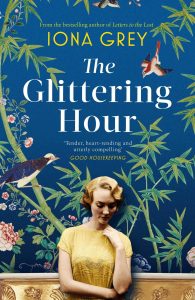
Set in 1925, The Glittering Hour is a beautifully written historical saga with a clandestine romance at its core. Young socialite Selina Lennox lives a life of reckless hedonism: drinking, partying and often having her exploits captured by the press. However, one night, a chance encounter with struggling artist Lawrence Weston changes everything. An intense attraction between the two blossoms into forbidden love, but as the summer draws to a close, the dark side of pleasure is revealed to both.
Ten years later, Selina’s nine-year-old daughter, Alice, is staying at Blackwood Hall with her grandparents. And as she reads Selina’s letters, the mystery of her mother’s past heartache begins to unravel…
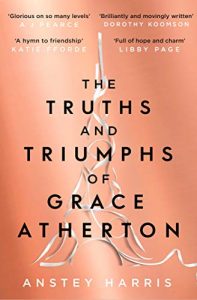 The Truths and Triumphs of Grace Atherton, Anstey Harris, Simon & Schuster
The Truths and Triumphs of Grace Atherton, Anstey Harris, Simon & Schuster
The Truths and Triumphs of Grace Atherton is a charming, powerful story of friendship and healing in the face of heartbreak. Residing in Paris with her long-term partner, cellist Grace Atherton lives in a blissful bubble of music and love. But when her world falls apart, Grace seeks comfort from two unlikely allies: eighty-six-year-old Maurice Williams and tough-talking teenager Nadia. All three have buried secrets and sufferings but, as their bonds grow, each are gradually compelled to open up. As the pain of the past begins to ease, the trio embark on a journey toward renewed happiness, self-acceptance, and hope.
The Flatshare, Beth O’Leary, Quercus Fiction
The Flatshare is a quirky, uplifting romcom that follows two people thrown together at just the right moment. When her relationship falls apart, Tiffy Moore agrees to share a one-bedroom flat with Leon Twomey. However – since Tiffy works 9 to 5 and Leon is a palliative care nurse who works nights and weekends – the two initially never meet. Through post-it note conversations, Tiffy and Leon slowly win each other’s trust and friendship, and are able to support each other through the pressures and frustrations of their difficult circumstances. With its poignant explorations of justice and unhealthy relationships interwoven throughout, The Flatshare is both an entertaining and heart-warmingly tender read.
 Poppy’s Recipe for Life, Heidi Swain, Simon & Schuster
Poppy’s Recipe for Life, Heidi Swain, Simon & Schuster
Poppy’s Recipe for Life is a warm and witty story of unlooked-for romance, family ties, inner demons, and the power of community. Poppy can’t wait to live out her dream of moving into a cosy cottage in Nightingale Square, close to a community garden where she can indulge her love of making preserves and pickles. However, when old family tensions once again bubble to the surface, her idyllic happiness is threatened. Amidst the complications, Poppy must also learn to get along with her prickly new neighbour, Jacob. But as the two grow closer, she begins to realise that the surly recluse may be more than he seems…
The winner will be announced at Leonardo Royal London City Hotel on Monday 2nd March.
Jean Stubbs is the author of the INSPECTOR LINTOTT INVESTIGATIONS series and the BRIEF CHRONICLES series. In celebration of her life and work, we asked her daughter, Gretel McEwen, to share her memories of Jean and her writing.
We lived in a world of stories, the line between reality and fiction often blurred. As a child, my mother had always made up plays and stories — her brother an unwilling but worshipful bit part player. A generation later, my mother made up fictional characters for my brother and I — she brought them to life with special voices and we talked to them. Alfred was a gentle and not very bright giant whose answer to any question was 29!
My mother had her first novel, The Rose Grower, published at the age of 35 and from that moment our house was filled with a whole cast of characters. I came home from school one day to find her weeping over the death of Hanrahan (Hanrahan’s Colony). And the hanging of Mary Blandy (My Grand Enemy) brought very dark clouds into our house.
As my mother surfed her way through this creative theatre, we learned to read the signs — coffee cups on every surface, a sink full of dishes and no plans for supper meant a good and productive writing day. A house full of the smell of baking, a gleaming kitchen and rice pudding in the oven either meant the dreaded writer’s block or a completed first draft. So we too surfed, adjusted and gloried in the passing show. My mother always wrote on our vast Edwardian dining table, and her writing companion was always the current much-loved cat. They had their own specially typed title page upon which to sit, since she had learned the hard way that cats like to sit on the top copy with muddy paws! The mystery cat was the black one who sat on a certain stair — but when you went to stroke him he was not there … another blurred line…
 I felt closely involved with each novel as it progressed. At the end of a good writing day, my mother would read aloud to me the latest chapter — a fine reader with a different voice for each character, once more bringing it all to life. She wrote in long hand at first, then, as the book grew, she typed chapters then full copies and carbon copies for her publisher, Macmillan. Later, she was one of the early authors to use a word processor. When the first print draft came from the publisher, we would sit at each end of the dining room table and proofread — calling out corrections to each other and marking them on the manuscript.
I felt closely involved with each novel as it progressed. At the end of a good writing day, my mother would read aloud to me the latest chapter — a fine reader with a different voice for each character, once more bringing it all to life. She wrote in long hand at first, then, as the book grew, she typed chapters then full copies and carbon copies for her publisher, Macmillan. Later, she was one of the early authors to use a word processor. When the first print draft came from the publisher, we would sit at each end of the dining room table and proofread — calling out corrections to each other and marking them on the manuscript.
Publication day was a celebration, shopping an occasion, dinner parties a reason for more excellent cooking, and royalty cheques a relief! When I left home, I greatly missed being a bit part player in this imaginative and unpredictable life of stories — and I missed the ghostly companions.
CLICK HERE TO FIND OUT MORE ABOUT THE INSPECTOR LINTOTT INVESTIGATIONS
CLICK HERE TO FIND OUT MORE ABOUT THE BRIEF CHRONICLES
Deborah Swift is the author of PAST ENCOUNTERS and THE OCCUPATION.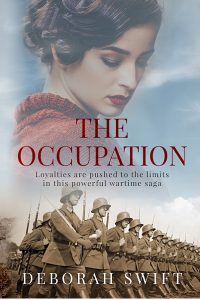
During World War Two, the Channel Islands were the only part of the British Isles to be occupied by the Germans. I saw a picture online of a British ‘bobby’ or policeman talking to a Nazi soldier, and it sparked my interest. Jersey is a tiny island, only eight miles long, so I was fascinated to find out how the population managed to keep up their morale, when as many as fifteen thousand (yes, you read that right) Germans had taken over. What happened to the Jews on the island, or to the other groups that the Nazis considered ‘undesirable’? How did it feel to be invaded by a foreign army?
The story became much more interesting and involved the more I uncovered. At the beginning of the war, Jersey had been ‘stood down’ for military action, as nobody believed the Germans would want such a small territory. Men of fighting age had been sent elsewhere, so it was a population of women and farmers. When the invasion came, it was a total surprise and there were no defences in place. After a brief bombing campaign, the German army just walked in. Before long, white ‘surrender’ flags were fluttering from Jersey houses.
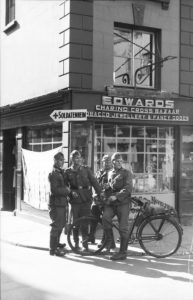
German soldiers standing in King Street, St Helier, Jersey
This was the beginning of Nazi rule on the islands, which was supposed to be a ‘peaceful’ occupation. Of course, when you are invaded it might look peaceful, but underneath the tensions soon began to show. The oppressive Nazi force vastly outnumbered the British people left on the island. Those that remained had to find ways to resist, and ways to outwit the unwanted intruders in their traditional way of life. German rule took over – people had to speak German, cars had to drive on the right, many things that had been allowed before, such as owning a car or a radio, were ‘verboten’ – forbidden. The Germans began a vast building programme to fortify the island, which they intended to use at a military base to attack England. The vast concrete fortifications were built by slave labour.
My story is based on several true accounts, although I have welded them together and compressed them into a fictional narrative. Céline and Rachel’s story was inspired by the true Jersey story of Dorothea Weber, who hid her Jewish friend Hedwig Bercu from the Germans. More on this surprising real life story can be found here.
Fred’s story in The Occupation is based on a number of accounts of life in the Germany army, and in the French Resistance. I was interested to examine the idea of occupation from the point of view of both the occupier, and the occupied. What always interests me in fiction is the conflicts that arise because of the circumstances of war, where one nation is pitted against another, and people who might have been quite amicable before the conflict are forced to swear allegiance to a sharp division between one side and another, when in reality, and in people, many shades of grey exist.
For an overview on the occupation of Jersey, the BBC history site has several pages on this topic. For more on Deborah’s books, find her at www.deborahswift.com or on Twitter @swiftstory.
CLICK HERE TO ORDER THE OCCUPATION
Image Credit: Bundesarchiv, Bild 101I-228-0326-34A / Dey / CC-BY-SA 3.0. Accessed via Wikimedia Commons.
Hi Michael! Welcome to the Sapere Books blog!
We are very excited to be publishing your HUNTER KERR detective series. Could you tell us a bit about what first got you into writing?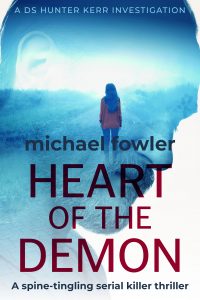
I started at about the age of twelve, and it was a science fiction apocalyptic story, written in two exercise books from Woolworths. I had an uncle, who was not only an avid reader but had a wonderful imagination, and as a teenager, I would spend many autumn and winter nights with him developing characters and drafting first chapters in front of a glowing coal fire with just a single table lamp burning. It made for a wonderful atmosphere and it was my uncle who introduced me to crime fiction.
Where and how do you like to write?
I have a study set out with everything I need. I start my day walking my dog on fields at the back of my home, and as I’m walking, I am working through what I will be writing when I return. I then hammer away at my keyboard for about five hours, doing some refining along the way, and then take my dog out for his second walk, reflect on the piece I have just written and do a mental edit. I’ll then return and make a few adjustments.
What part of the writing process do you find most difficult?
I am a constructive plotter, and so work out a beginning and end, and build in significant events in the middle, to drive the story. In my study I have a huge whiteboard, and I ‘run’ my stories as if they were a major incident (from my detective days), with photographs, timelines, and spider lines connecting characters to story, so I can keep track.
How much research do you normally do before you start writing?
Not a great deal. Because my crime novels are based very much on my previous career as a detective, I am drawing on those experiences.
How real do your characters become?
Many of my characters are based on people I know or have met, so it’s quite easy for them to own their story.
Do you ever feel guilty about killing off your characters?
Not the villains. As I have said above, they are generally based on the villains I have come across during my career and so I find bumping them off quite cathartic. However, I have just killed off one of my leading detectives in my Hunter Kerr series and I had a great deal of angst about doing so.
What are you working on at the moment? 
I am working on a new character who is a forensic psychologist in a psychological thriller, which is a huge shift for me as my previous novels are police procedurals.
What is your favourite book?
I am such an avid reader I don’t have a favourite book or character. However, there are a few recent reads that stand out among others, and they are: Into the Darkest Corner by Elizabeth Haynes; The Dry by Jane Harper; Her Every Fear by Peter Swanson; Fall from Grace by Tim Weaver, plus The Bone Field by Simon Kernick.
Which book do you wish you had written?
The Bone Collector by Jeffery Deaver – I love the unique element of a paraplegic crime scene examiner detecting a crime from his bed.
Tell us something surprising about you!
I am also an established artist. I have exhibited in London’s Mall Gallery with The Society of Marine Artists, The Society of Oil Painters and the British Federation of Artists. In 2009 I was awarded the SAA Professional Artist of the Year.
Michael Fowler is the author of the DS HUNTER KERR INVESTIGATIONS series.
Click here to order HEART OF THE DEMON – the first book in the series – now!
COLD DEATH – the second book in the series – is available to pre-order.
Happy new year to all of our wonderful authors and readers, and thank you for your continued faith and support! 2019 saw us expand our list with some incredible titles and we can’t wait to share more with you this year.
Here’s what to expect from 2020:
We will soon launch our non-fiction list, led by Sapere co-founder Richard Simpson. Richard is on the lookout for military history titles – backlist in particular – and aims to launch the first few books on our second anniversary in March.
Our ‘call for nautical fiction’ has been successful and we will soon be releasing Irving A. Greenfield’s Depth Force series – thrilling submarine adventures set in the 90s, as well as the first in a series of Second World War naval thrillers by Justin Fox, and a trilogy of Tudor nautical adventure books by David Field.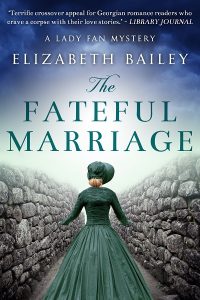
We also have plenty of exciting new projects from our current authors, so look out for the next books in the series you already love! These include the final instalment of Alexandra Walsh’s Marquess House Trilogy; the next ghostly adventure in Linda Stratmann’s Mina Scarletti series; a new Lady Fan regency mystery from Elizabeth Bailey and a return of Charles Dickens as private investigator in J C Briggs’ Victorian series.
We also have brand new authors launching next year and plenty more fan favourites! Make sure you sign up to our newsletter to stay up to date with our latest releases and monthly deals.

